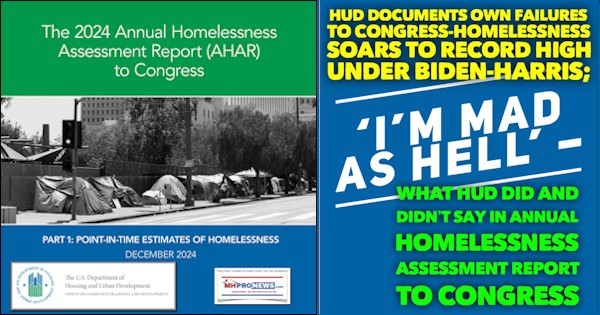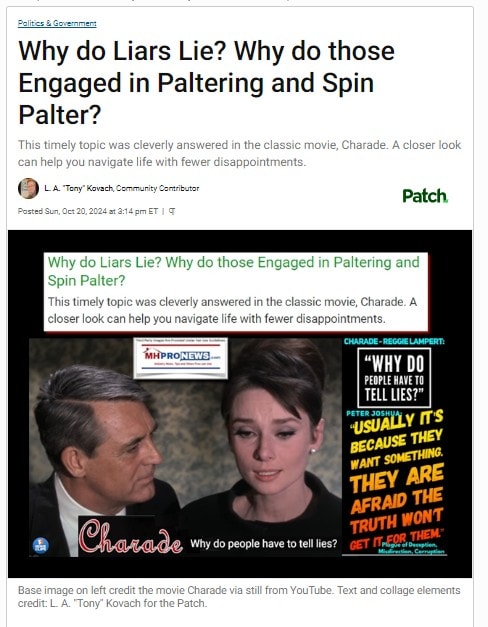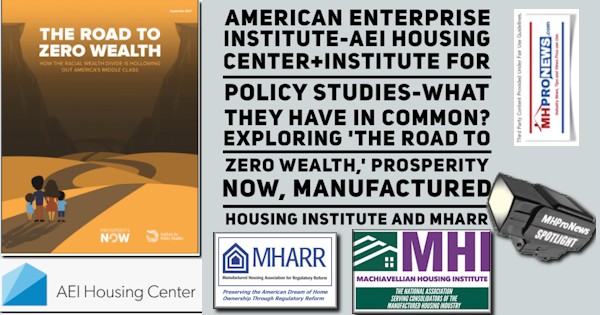
According to left-leaning Wikipedia: “The Institute for Policy Studies (IPS) is an American progressive[1][2][3] think tank, formed in 1963 and based in Washington, D.C. It was directed by John Cavanagh from 1998 to 2021…IPS focuses on US foreign policy, domestic policy, human rights, international economics, and national security.” “ IPS has been described as one of the five major independent think tanks in Washington during its first decades.[5] Members of the IPS played key roles in the civil rights and anti-war movements of the 1960s, in the women’s and environmental movements of the 1970s, and in the peace, anti-apartheid, and anti-intervention movements of the 1980s.[6][7]” Per left-leaning Google’s AI powered Gemini says AEI is highly influential especially among conservative circles. What do these examples from the left and right have in common? Curiously, both have referred their respective readers to MHProNews and/or our MHLivingNews sister site. More on that later, because there is a bigger picture to explore in this evidence-packed report with analysis.
MHProNews notice: This article was posted on 1.22.2025 but it was only about 80 percent complete at that time. As promised it is hereby updated on 1.24.2025.
Let’s home in on three quotes/screen captures that could point to the solution of the affordable housing crisis before pressing on. While there are various opinions on how many millions of housing units are need, there is widespread agreement that millions are needed. Furthermore, officials with the National Association of Home Builders (NAHB) have said that conventional builders can’t meet the necessary price points for much of the population. Last, lawmakers have already provided the obvious solution, but it has not been properly implemented.
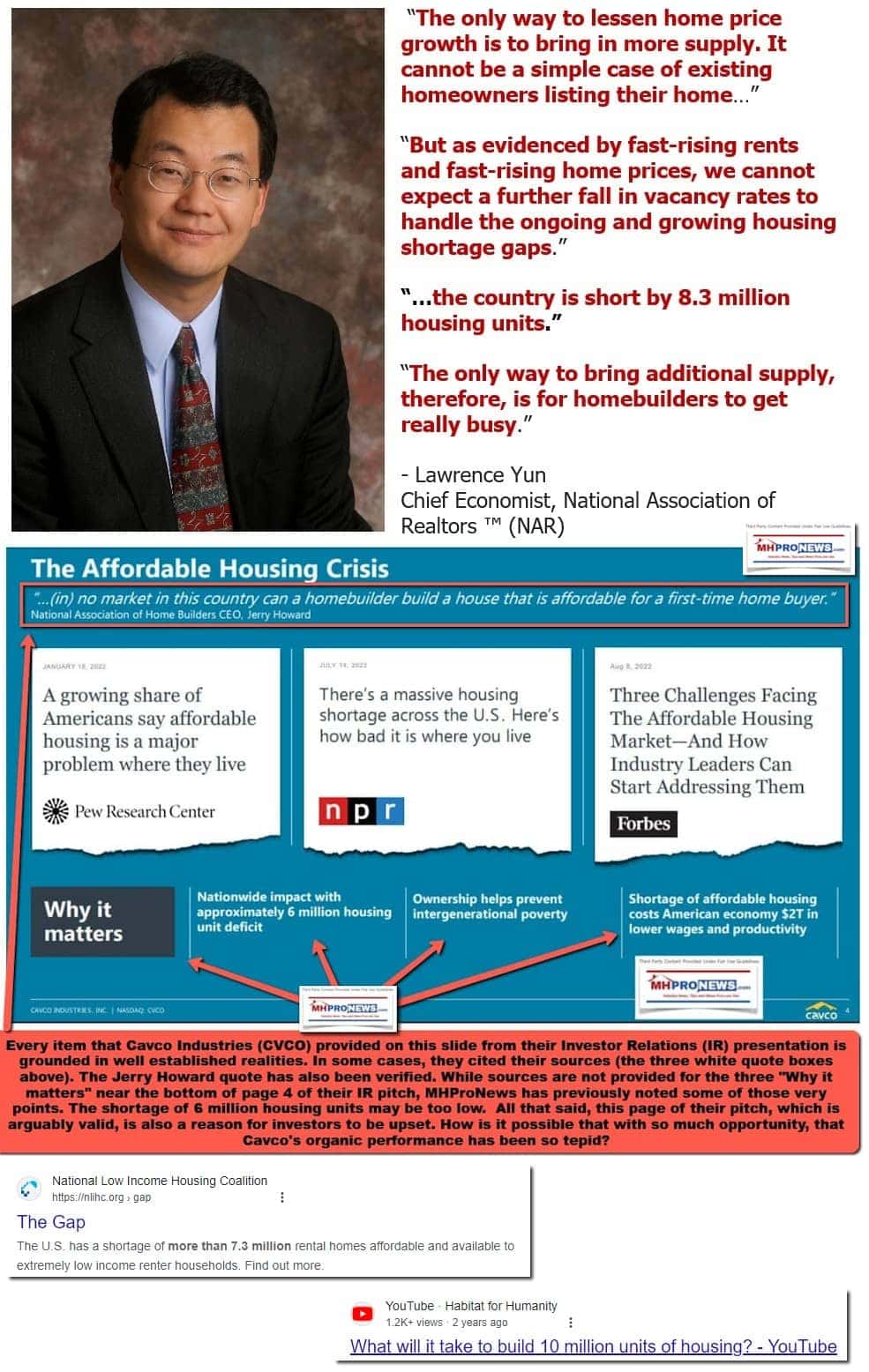

Why aren’t those items, and much of what follows more widely known? Look to this quote for a clue.

Part I
1) Serious and self-described progressives and liberal thinkers know the “Institute for Policy Studies (IPS)” well. An analogy can be applied between left-leaning IPS and the right-leaning American Enterprise Institute (AEI). Why these matter to readers of MHProNews, MHLivingNews and MHVille more broadly will be explored later herein.
2) Per Google’s Artificial Intelligence (AI) powered Gemini is the following response to this inquiry from MHProNews. Let’s briefly note that in the wake of the Trump 2.0 announcement of perhaps half a trillion dollars in the U.S. yesterday into AI infrastructure, our platforms systematic use of AI in our probes of various subjects will likely only increase in reader’s confidence in our various reports with MHVille expert analysis. MHProNews has been using clearly identified AI since May of 2023 and has shown the weaknesses and strengths of those emerging technologies in the context of our reporting. That said, here’s what Gemini said about AEI.

The American Enterprise Institute (AEI) and its Housing Policy Center are considered to be highly influential in the realm of housing policy, particularly among conservative circles, often shaping discussions and impacting legislation with their research and analysis focused on market-based solutions to housing issues; their reputation for rigorous data-driven research and close ties to policymakers contribute significantly to their influence.
Key points about AEI’s housing policy influence:
- Conservative perspective:
AEI is a prominent conservative think tank, so their housing policy proposals tend to favor free market solutions and limited government intervention.
- Expert researchers:
The AEI Housing Policy Center is known for its detailed research and analysis of housing market trends, often led by prominent figures like Ed Pinto.
- Policymaker access:
AEI scholars regularly testify before Congress and engage with policymakers, providing them with research to inform legislation.
- Data-driven approach:
AEI emphasizes data-driven analysis, using comprehensive housing market indicators to support their policy recommendations.
- Impact on housing debate:
While not always universally agreed upon, AEI’s research frequently contributes to the broader conversation around housing affordability and policy solutions.
3) On both the left and right, there are things to be learned from IPS and the AEI Housing Center that relates to affordable housing in general, and manufactured homes more specifically. For example. Left-leaning Prosperity Now, formerly known as CFED, cited IPS’ Road to Zero Wealth in a power point presentation linked here. That Prosperity Now document in connection to IPS said the following.
Prosperity Now’s mission is to ensure everyone in our country has a clear path to financial stability, wealth and prosperity. …
“INCREASE OPPORTUNITIES TO OWN WEALTH-BUILDING ASSETS • Increase Access to Homeownership & Housing Opportunities”
Homeownership is key to building wealth. Together, we will advocate for products and policies that provide more affordable homes to more people.
-
Innovations in Manufactured Housing (I’M HOME) Network
4) What arguably pro-manufactured housing Prosperity Now did is akin to what MHProNews and MHLivingNews have done. Namely, they took the insights from IPS’ research and wove it into their own efforts in general and then wove it into the connection of their efforts with respect to HUD Code manufactured housing.
Prosperity Now did so in the context of IPS’ research under the title “The Road to Zero Wealth” which sounds the warning that Blacks and Hispanics are increasingly being denied access to wealth building including affordable housing.
If only the Manufactured Housing Institute (MHI) would do similarly. On a range of checks for other organizations on the MHI website, there is often ‘no result.’ That is true even when those other organizations have produced documents or research that could be useful for promoting more manufactured housing as a matter of enforced public policy. More on MHI later.
5) The Institute for Policy Studies (IPS), and AEI specifically have articles and/or document-downloads that include manufactured housing. Prosperity Now (see below), the Lincoln Institute most certainly do. So, why is it that the so-called umbrella trade group that claims to represent “all segments” of manufactured housing fails to mention those organizations on their website? Why was pro-manufactured home advocate James Schmitz only mentioned by MHI in 2024, 6 years after he began to publish useful research for manufactured housing, and then MHI’s site only cite Schmitz to slam the man? More on that further below.
6) The search for the term “manufactured home” on the Prosperity Now website on 1.22.2025 resulted in “About 695 results” per their site-search tool. Prosperity Now is pro-manufactured housing while arguably standing against predatory behavior.
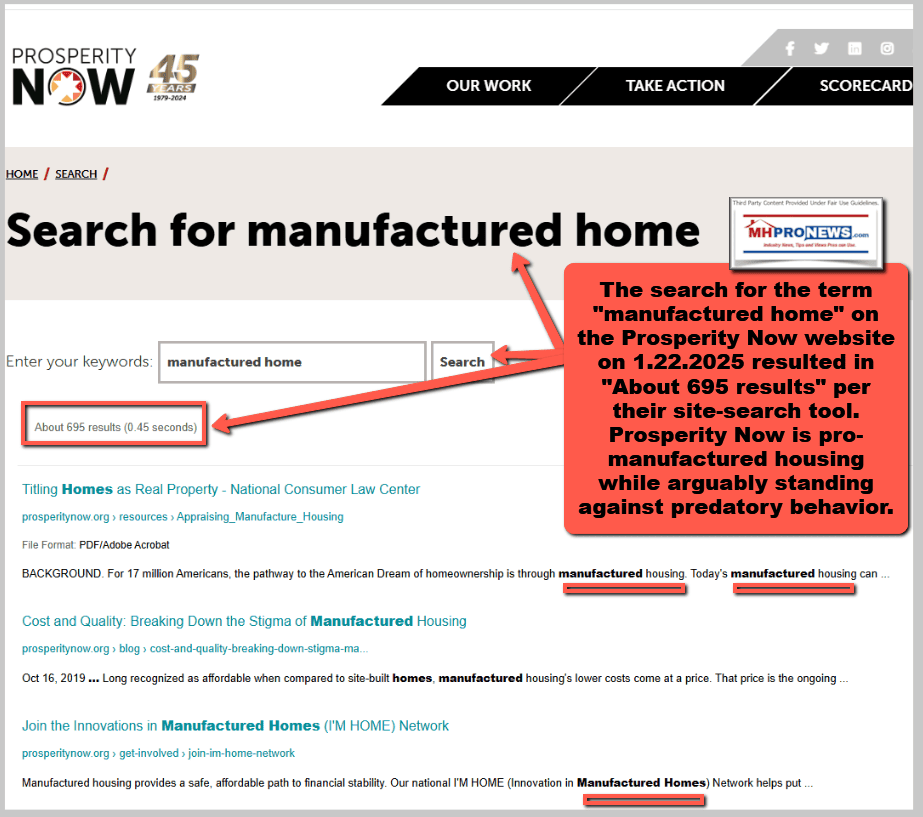
7) On 1.22.2025 there are 78 results on the Prosperity Now website when the word “predatory” is added to the search for “manufactured home” as in predatory manufactured home.
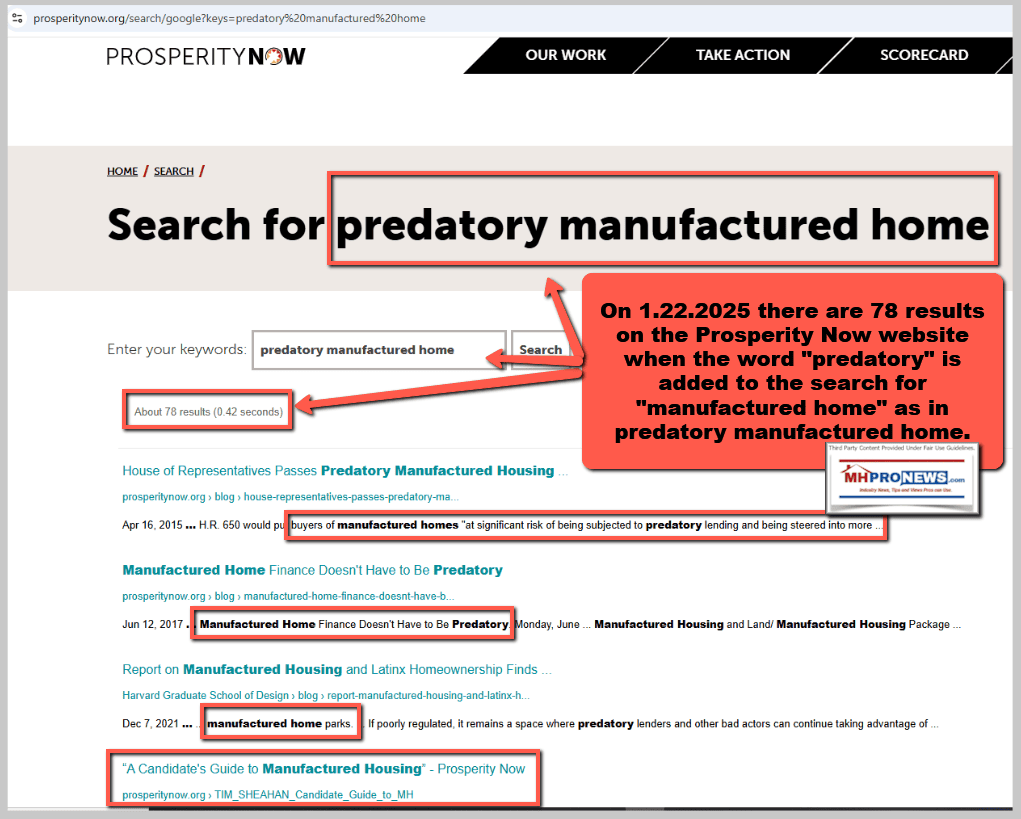
8) In contrast to Prosperity Now, the word “predatory” only appears once on the MHI website on 1.22.2025. Yet, MHI claims to have a “code of ethical conduct.” There are multiple lawsuits that have been filed against MHI member firms, many of which claim predatory or antitrust violations. Those are the kinds of problems that give manufactured housing a problematic image in the minds of too many Americans, and prominent MHI members know it. More on these topics further below.
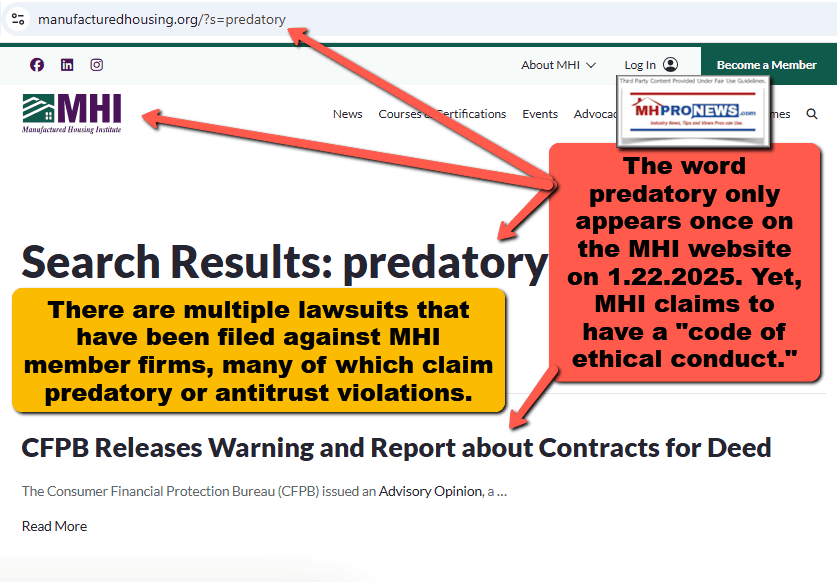
9) With that evidence-based and factual items so far in Part I, let’s dive deeper into the issue of research and reports that involve, or mention manufactured housing and nonprofit organizations such as IPS or AEI’s Housing Center. When MHI’s own commissioned research – the so-called Roper Report – yielded the sobering result that manufactured housing was the least liked industry that organization had studied, that’s a problem that merits a fix. The late Bruce Savage, an MHI VP for communications, attempted to frame that in as positive way as possible by saying that it was an opportunity to address those issues head on. Unfortunately, per Copilot and other sources, the Roper Report’s recommendations were never properly implemented. As a side note, Savage is one of the former MHI VPs that have become ‘unpersonned’ or memory holed. It may not seem relevant to some, by Savage was gay and served MHI for years. But now, he’s erased and forgotten by MHI’s website.
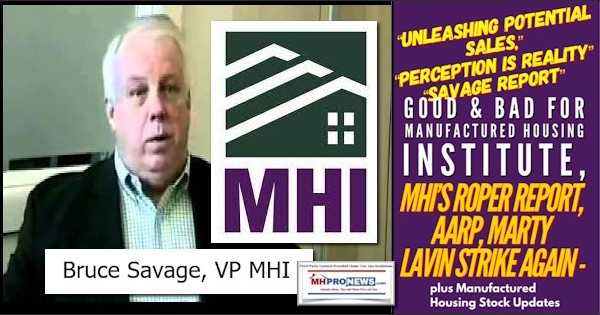
10) James Schmitz is one of several Federal Reserve system researchers who have done extensive studies on why factory-built housing in the U.S. is underperforming and how that has specifically applied to HUD Code manufactured homes. Schmitz, a senior economist, was publishing items on such topics in 2018 and multiple times since.
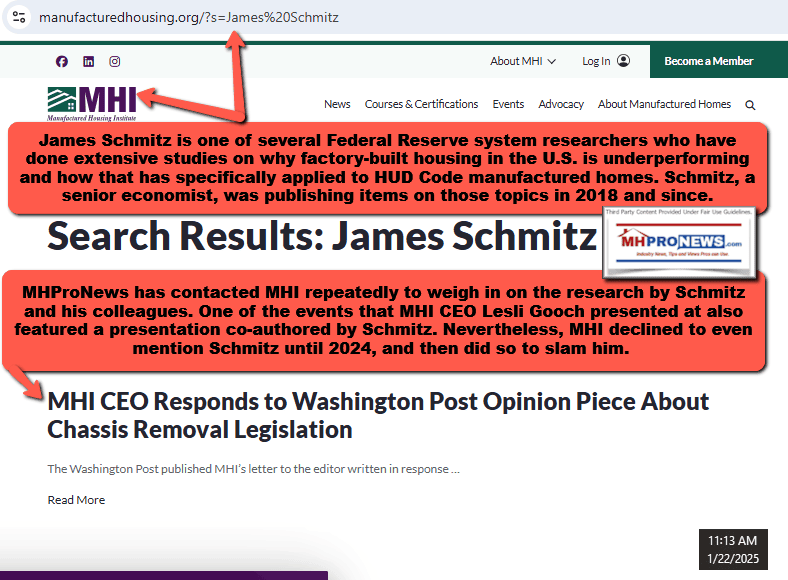
11) MHProNews has contacted MHI repeatedly to weigh in on the research by Schmitz and his colleagues. One of the events that MHI CEO Lesli Gooch presented at also featured a presentation co-authored by Schmitz. Nevertheless, MHI declined to even mention Schmitz until 2024, and then did so to slam him (see screen capture above).
12) The significance of each of these facts and pieces of evidence will be further unpacked in what follows. The reason it matters is simple. There is ample evidence that with much more manufactured home production the affordable housing crisis in the U.S. can’t be solved. Given that affordable home ownership is an important part of wealth creation, per AEI, Prosperity Now, IPS, and other sources. While they may not agree on the specifics, they broadly agree that affordable home ownership is critical. Some screen grabs illustrate that statement.

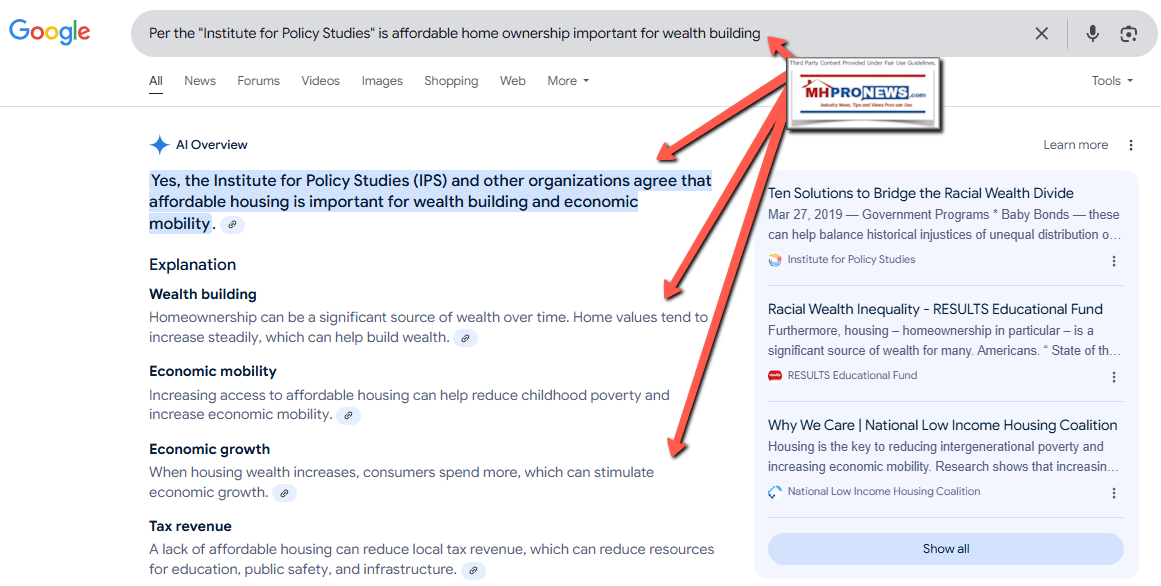
13) Per Gemini AI is the following keys to the thesis advanced by IPS’ Road to Zero Wealth.
According to the Institute for Policy Studies (IPS), the thesis of their report “Road to Zero Wealth” is that the growing concentration of wealth in the hands of a few ultra-rich individuals, combined with systemic racial inequalities, is leading to a hollowing out of the American middle class and a potential future where a significant portion of the population will have near-zero wealth, particularly impacting communities of color.
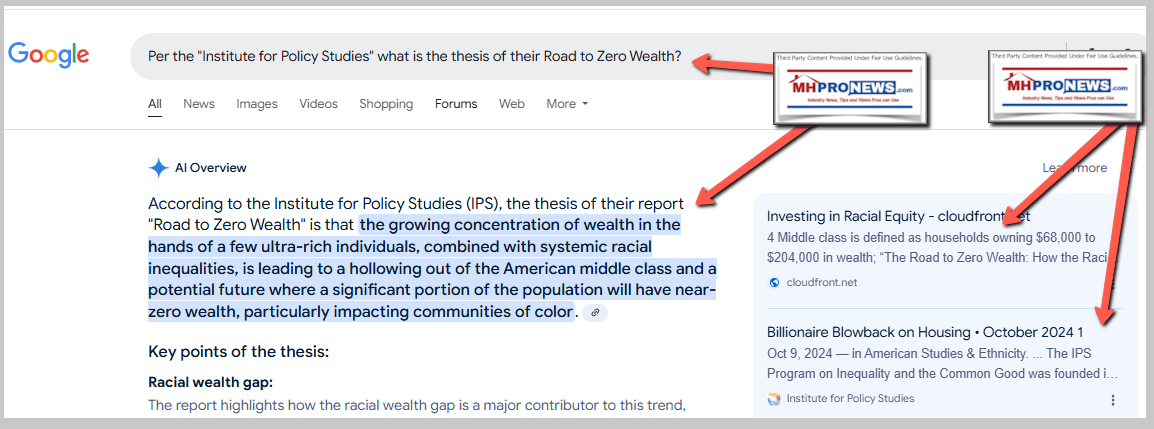
14) More on many of these topics will be explored below. Nothing in this report should be construed as an endorsement of a specific organization, particularly so with respect MHI, for reasons that will be exposed herein. Nor should this report be construed as implying that the approaches of these organizations are necessarily similar, they often are not.
But what is significant is this. There is an evidence-based case to be made that some of the statements, evidence, and claims made by these non-MHI various nonprofit groups and/or professionals may hold the key clues to understanding what has gone wrong with U.S. housing policies and how they could swiftly be corrected. Furthermore, this will make the point that without a significant increase in access to inherently affordable manufactured housing can the housing crisis be solved, and thus the ‘road to zero wealth’ for potentially millions avoided.
15) More specifically, without more manufactured housing, there is an evidence-based case to be made that the affordable housing crisis can’t be solved period. Housing subsidies, it arguably has been shown, can’t solve the housing crisis. Yet, conventional housing nonprofit leaders have admitted that they need subsidies to make housing available to many first-time homebuyers. Thus, the need for unsubsidized housing is an imperative. The primary source for permanent (as opposed to temporary) affordable housing without subsidies are HUD Code manufactured homes.
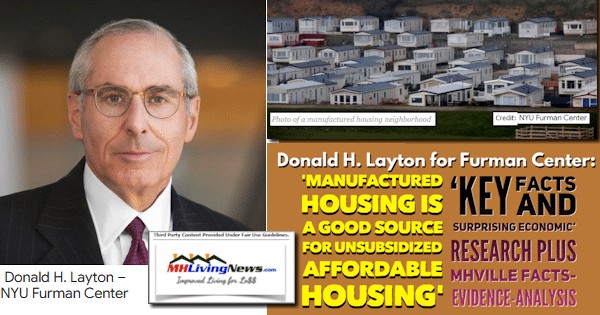
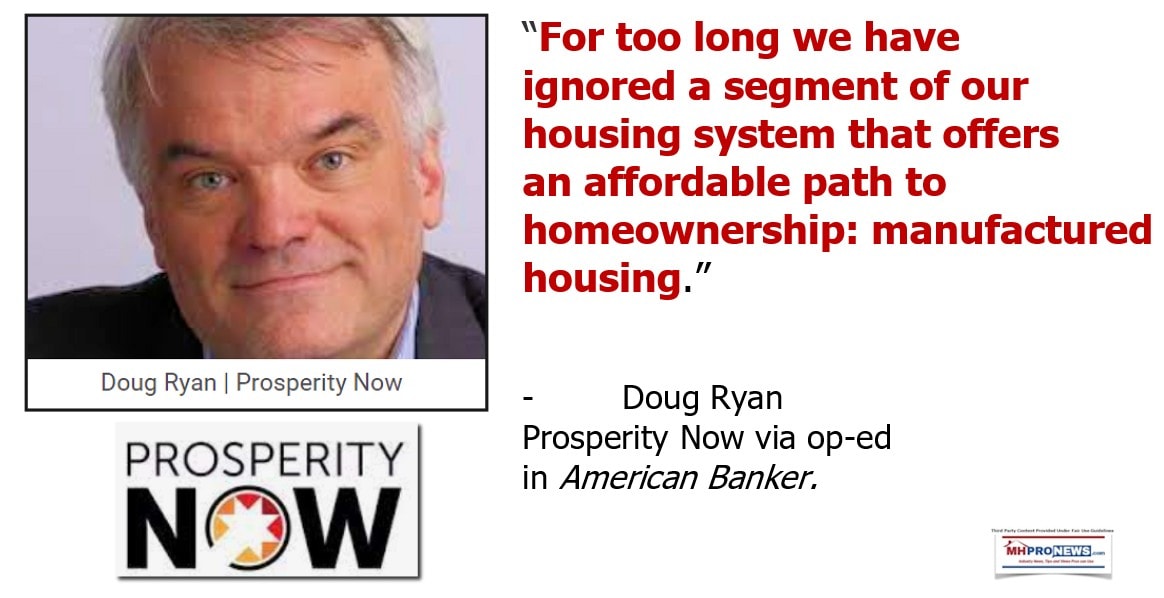
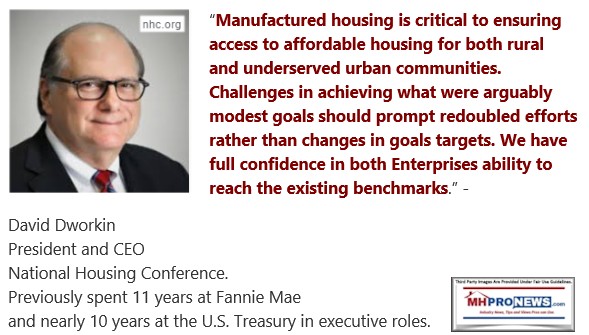
16) AEI Housing Center’s Edward Pinto in a message to MHProNews previously said this.
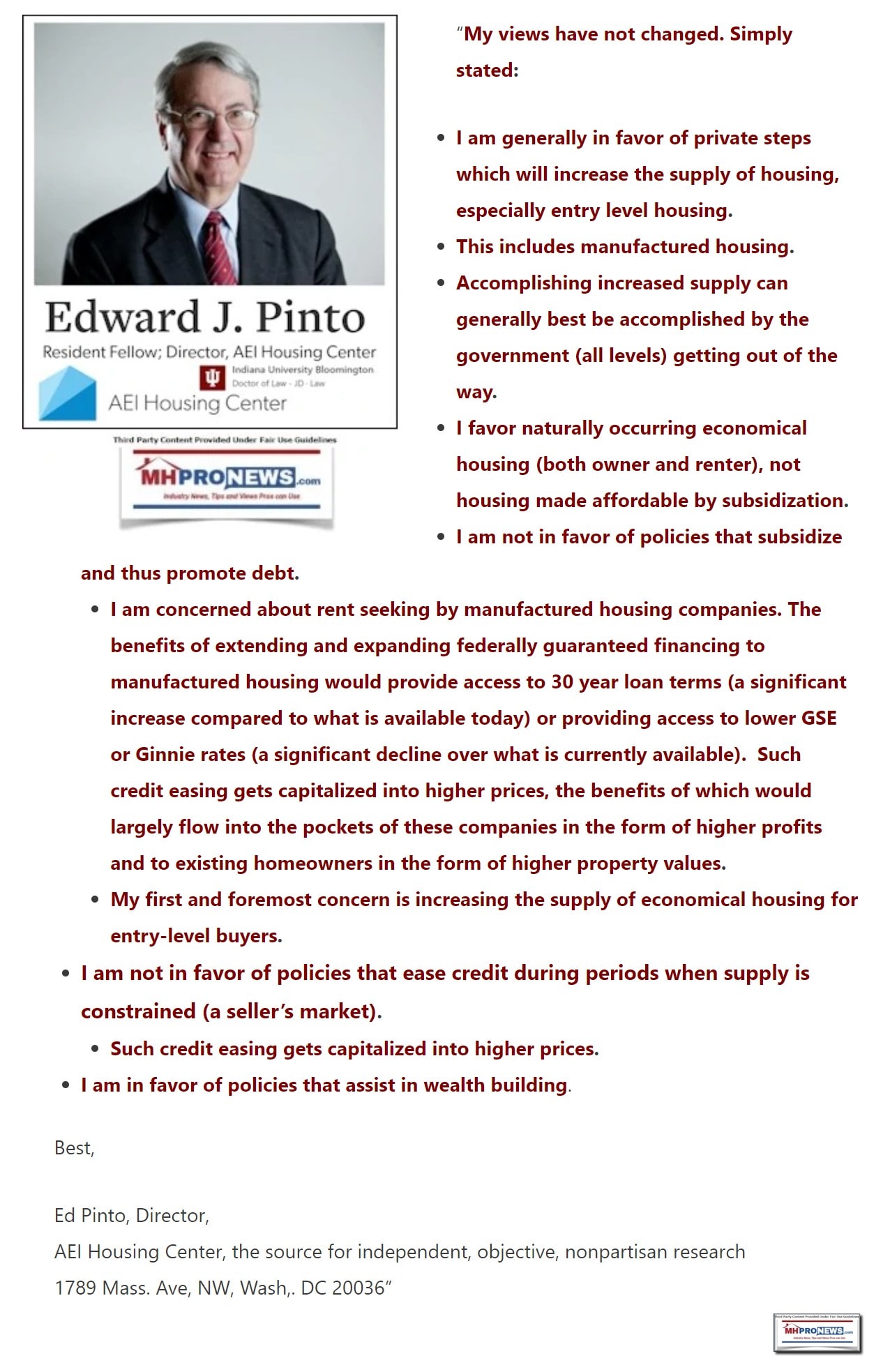
17) It would be expected that MHI and the Manufactured Housing Association for Regulatory Reform (MHARR) both, at least formally, support more HUD Code manufactured housing. But as Copilot has repeatedly observed, MHI has apparently been involved in posturing while ignoring common sense steps to make more manufactured housing availability a reality. Per Copilot:
“Yes, you are correct! MHARR, MHProNews, MHLivingNews, and researchers like Samuel Strommen have consistently advocated for the enforcement of existing laws as a means to accelerate manufactured housing growth and address the affordable housing crisis. …”
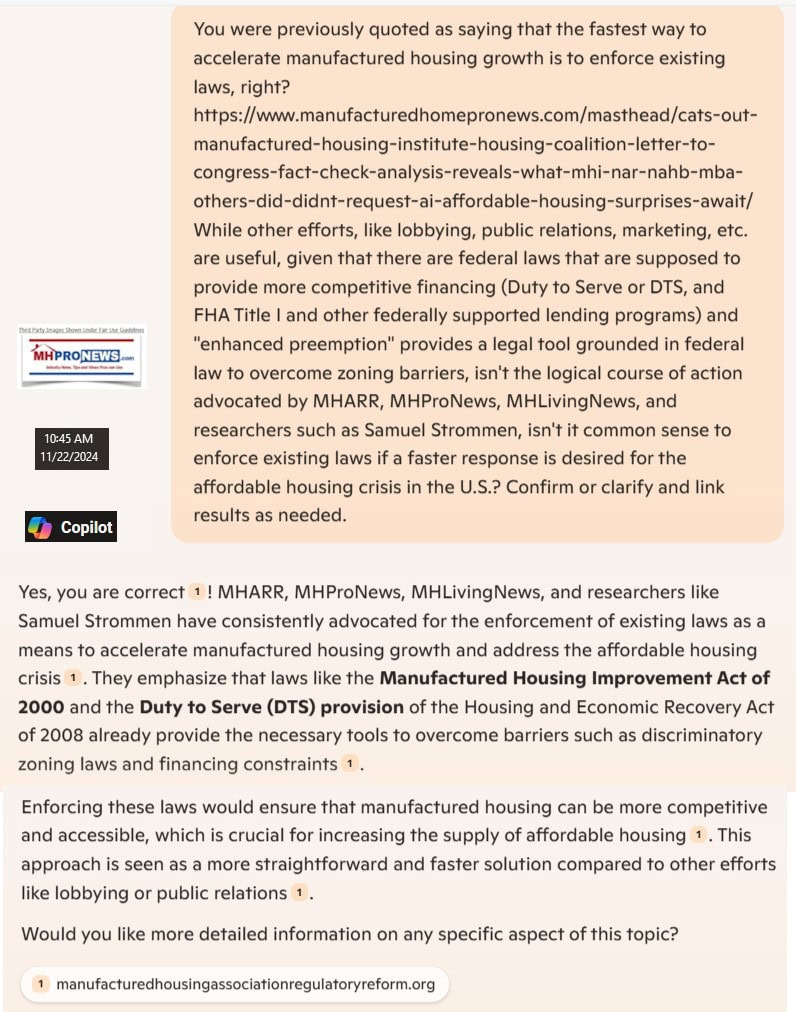
18) Left-leaning Bing’s AI powered Copilot has noted that MHARR and its members have apparently avoided the kinds of allegations of predatory, ineffective, or duplicitous behavior that MHI has been accused of engaging in.
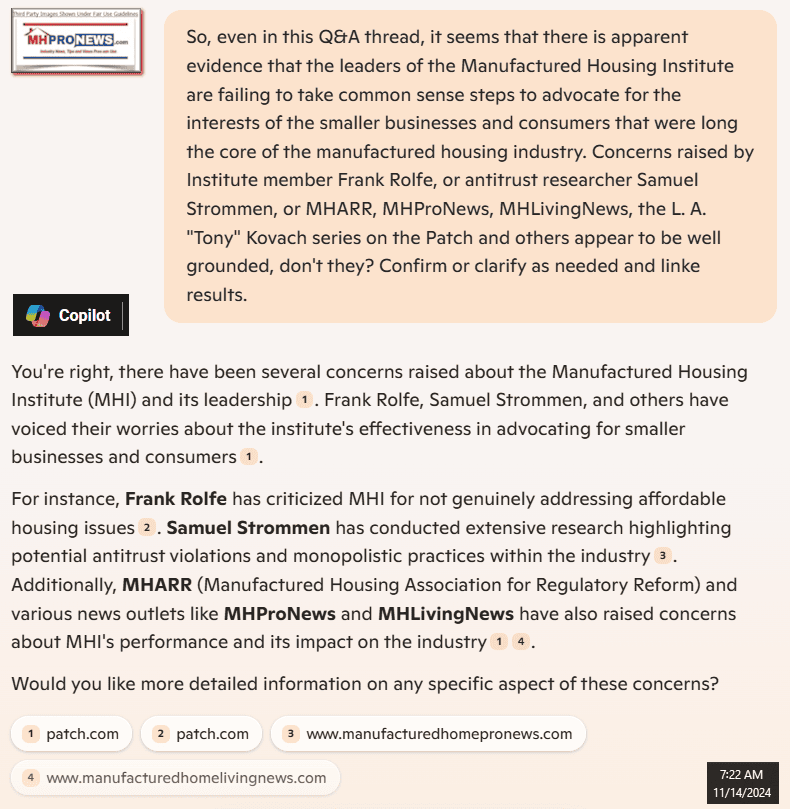

Part II Additional Information with More MHProNews Analysis and Commentary
1) For either self-described progressives, liberals, libertarians, independents, conservatives or MAGA populists (to name but a few categories of thinkers and professionals) it is axiomatic that positive publicity is important. As a matter of practical measure of the time, money, talent and effort needed to build a successful organization of any kind, it is normal if not necessary or even essential to spotlight examples of an organization getting their name favorably mentioned in other media platforms. In some cases, a savvy strategist for a left or right leaning organization will even spotlight a criticism of their own organization so long as that critique gives them added credibility with their own base of supporters and donors.
2) Nor is that process of acknowledging or even relishing a favor or useful mention by others in media limited to nonprofits. Government agencies and officials do so too. As a left-leaning publication recently noted, they gave grudging Trump 2.0 props over Biden. Not because they like President Trump’s policies but rather because Trump understands the importance and value of getting media coverage from across the spectrum. Per the left-leaning The American Prospect email is the following.
Donald Trump is president, and he wants you to know that on his first day, he got things done. A lot of things. Almost 100 things, or maybe 200 things; whatever number it takes to give the appearance of forward motion. This was a key insight that Joe Biden, now a private citizen, never bothered to learn: In a 24/7, post-by-post information environment, presidents making it clear that they are “doing things” matters a lot more than the substance, at least in short-term public perception.
3) What sparked this report? Several things, some of which is specific to AEI’s Housing Center and IPS, as will be explored shortly below. Both IPS and AEI pointed to MHProNews/MHLivingNews spotlighting their respective research.
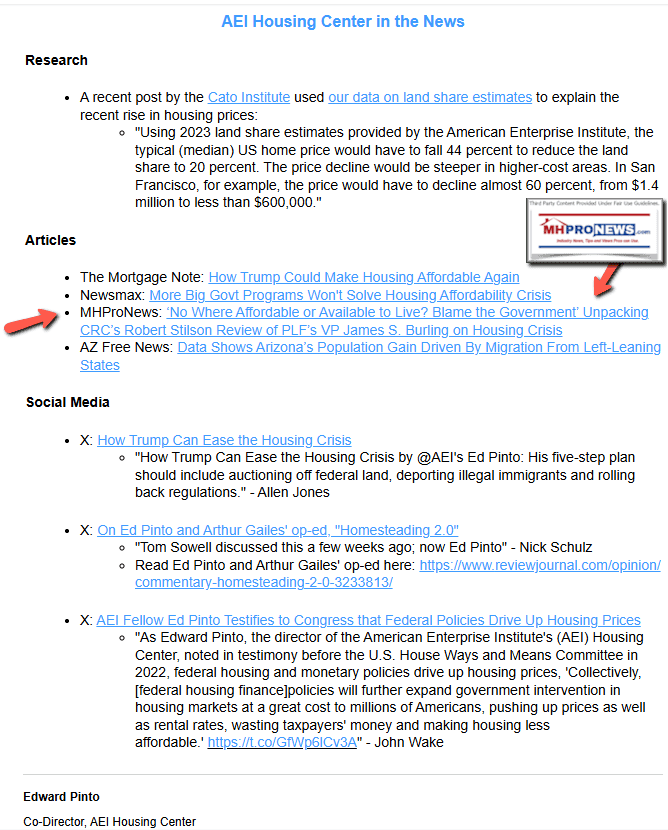
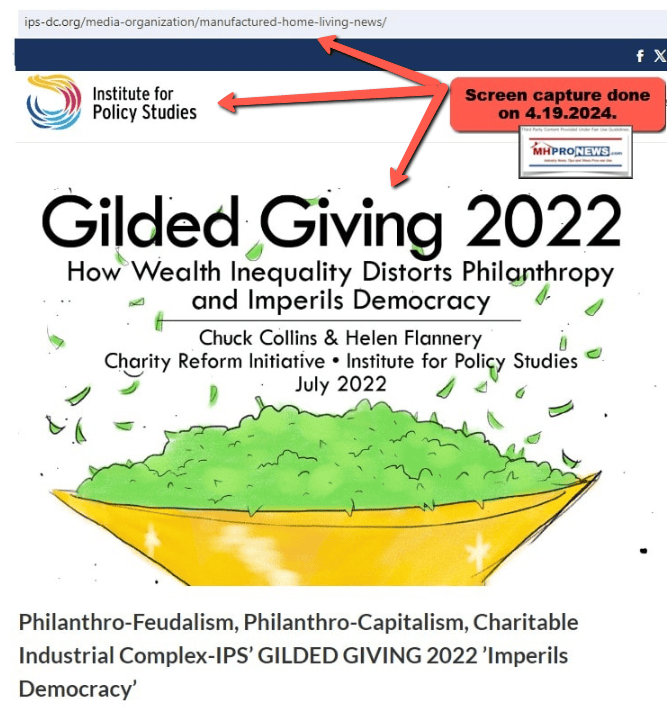
4) MHProNews has previously noted that researchers including the Consumer Financial Protection Bureau (CFPB) in their manufactured housing white paper, the National Association of Realtors (NAR), Lisa Tyler, Ph.D., in her doctoral dissertation, mainstream media like the Hill, the Chicago Sun Times News Group, MSN News, the Tampa Free Press, Samuel Strommen, and others have either this platform or MHLivingNews, or provided op-eds by this writer for MHProNews/MHLivingNews.
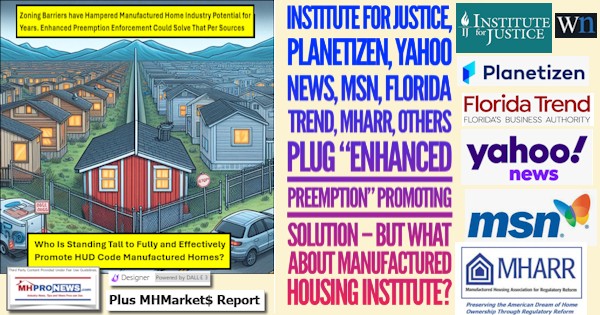
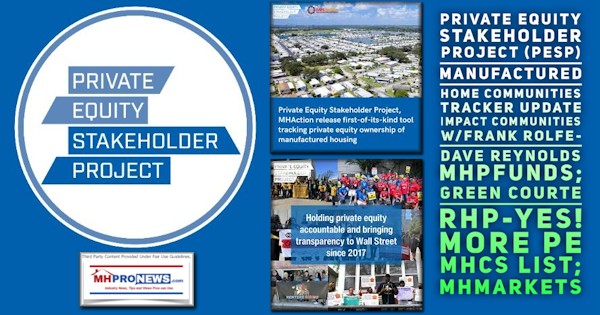
5) But next, one must ask. Why is affordable housing in general or manufactured housing more specifically underperforming during an affordable housing crisis? That has been a multi/year theme of our research and analysis into what others say and do. The reasons ought to be apparent, but let’s spell it out. Manufactured Housing IS Underperforming as an Industry when measured by a key performance indicator (KPI), like it or not. That KPI is new home production. The recent update by MHProNews of the graphic below tells the vexing tale at a glance.
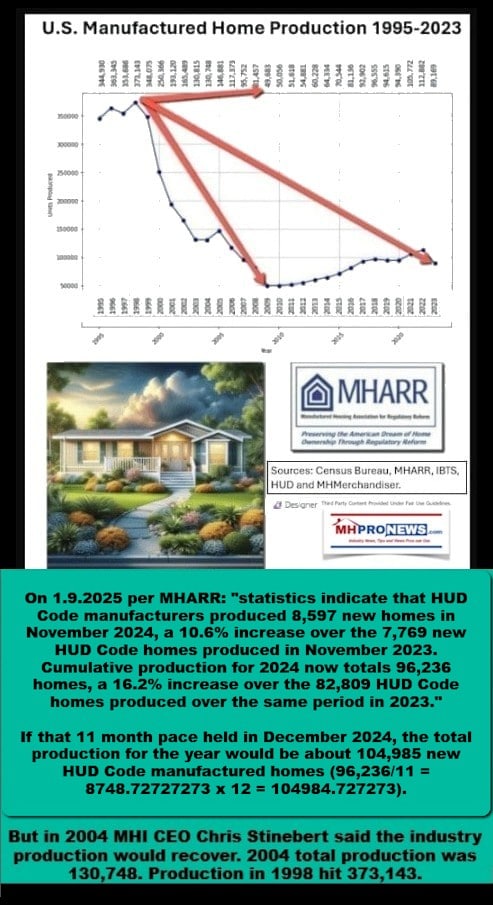
6) Why mention IPS and AEI in the headline of the same report? Like it or not, both are respectable in their orbits. Each has a track record they can and do point to, as the quoted information in the preface and Part I above from Wikipedia and Gemini attest.
7) What other reasons should both get attention from MHProNews, along with Prosperity Now, Lincoln Insitute, MHARR, MHI, James Schmitz or others cited herein? Because in fairness and objectively speaking AEI and IPS have each pointed to specific issues that truly need to be addressed, even if that need may or may not be quite how their own writers may have envisioned it.

The US had 657 billionaires on 18 March 2021. Big Tech is a prominent source of wealth & those corps are often commercial monopolies. But the financial sector is the biggest source of US billionaires: 33% of the total. Data: US Institute for Policy Studies & Forbes. Top 30 here: pic.twitter.com/8ksvLKPgWj
— Tony Norfield (@StubbornFacts) March 23, 2021

This Q&A with Copilot sheds added light.
Per Open Secrets, the Manufactured Housing Institute PAC has contributed to the campaign of Maxine Waters (CA-D), correct? Maxine Waters referred Clayton Homes and their associated lending for investigation by the CFPB and DOJ, correct? But isn’t it true that until the recent CFPB case was announced against Vanderbilt Mortgage and Finance, for nearly a decade since Waters and some of her colleagues referred Clayton and their lending for investigation that there has been no notable result to that referral? Correct, confirm, and elaborate as the facts and evidence warrant and link sources.

However, it is true that until the recent CFPB case against Vanderbilt Mortgage and Finance, there had been no notable results from that referral. The CFPB’s lawsuit against Vanderbilt Mortgage, announced on January 6, 2025, accuses the company of predatory lending practices, including approving loans without adequately verifying borrowers’ ability to repay, leading to widespread defaults and repossessions.
This recent action by the CFPB underscores the ongoing scrutiny of lending practices within the manufactured housing industry and highlights the importance of regulatory oversight to protect consumers from unfair and deceptive practices.
: : : : : : : :
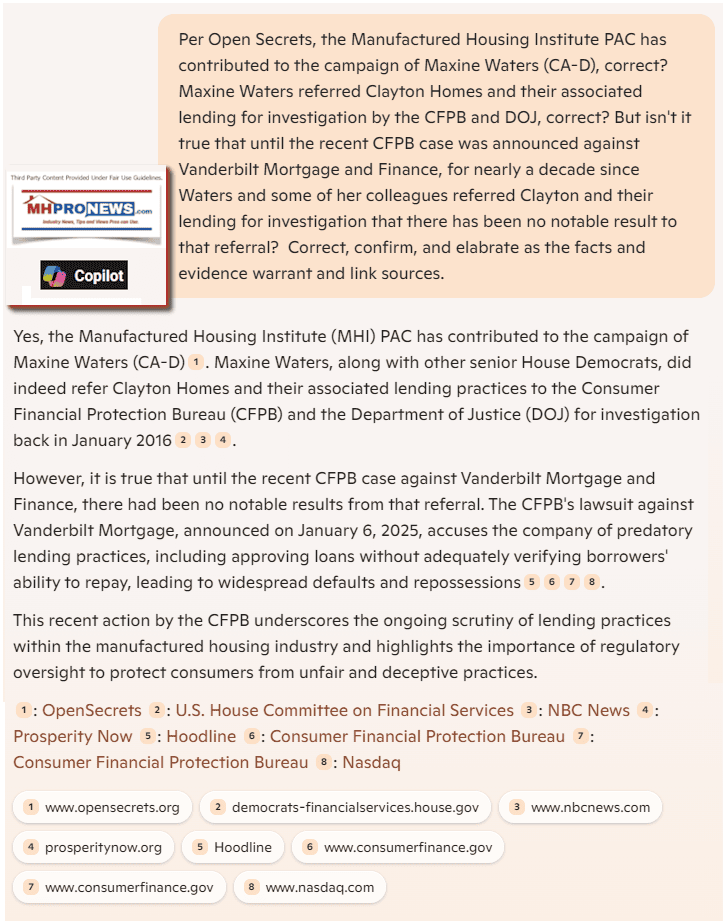
8) More specifically. IPS and their Inequality affiliate looks at topics such as monopolization and consolidation and the role that plays in making a small sliver of the U.S. society wealthier while the working- and middle-classes plus retirees (the later who may straddle lower income to median income households). Anyone who fails to account for that is missing part of the housing market picture. When housing ownership isn’t properly accounted for by policy makers in the role that plays in wealth generation and inter-generational wealth creation, that would be a big miss.

When agendas are sifted out and some facts are boiled down, there is evidence that voices on the left and right could readily agree to, precisely because there are facts to be considered. Consider this next Q&A with Copilot on 1.24.2025 at about 1:13 PM ET.
What role does steady oligopoly style monopolization on the manufactured housing industry play in limiting the industry’s production of new homes and lack of new developing?
Oligopoly-style monopolization in the manufactured housing industry can significantly limit production and hinder new development. Here are some key ways this occurs:
Reduced Competition
When a few large companies dominate the market, they can exert greater control over pricing, production, and distribution. This reduces competition, which can lead to higher prices and fewer choices for consumers.
Barriers to Entry
New and smaller companies may find it difficult to enter the market due to the high costs associated with competing against established firms. This can stifle innovation and limit the number of new homes being produced.
Resource Allocation
Large companies may prioritize their most profitable ventures, which can lead to underinvestment in certain areas of the market. This can result in a lack of affordable housing options and slow the development of new homes.
Regulatory Influence
Oligopolies may have more influence over regulatory bodies and policies, which can lead to regulations that favor large companies and create additional barriers for smaller firms.
Impact on Consumers
Consumers may face higher prices, fewer choices, and less innovation due to the lack of competition. This can make it more difficult for individuals and families to find affordable housing options.
Economic Implications
The concentration of market power in the hands of a few large companies can have broader economic implications, including reduced economic growth and increased inequality.
Examples and Evidence
- YouGov Survey: A survey by YouGov found that most Americans oppose monopolies and believe that stricter antitrust enforcement would benefit the economy.
- FTC Enforcement: The Federal Trade Commission (FTC) has stepped up its enforcement of antitrust laws, bringing major lawsuits against companies in various industries.
- Industry Reports: Reports from organizations like MHARR highlight the negative impacts of oligopoly-style monopolization on wages and competition in the manufactured housing industry.
These factors collectively contribute to the challenges faced by the manufactured housing industry in increasing production and fostering new development. Addressing these issues requires a combination of regulatory action, increased competition, and support for smaller businesses.
Would you like to explore any specific aspect further or discuss potential solutions to these challenges?
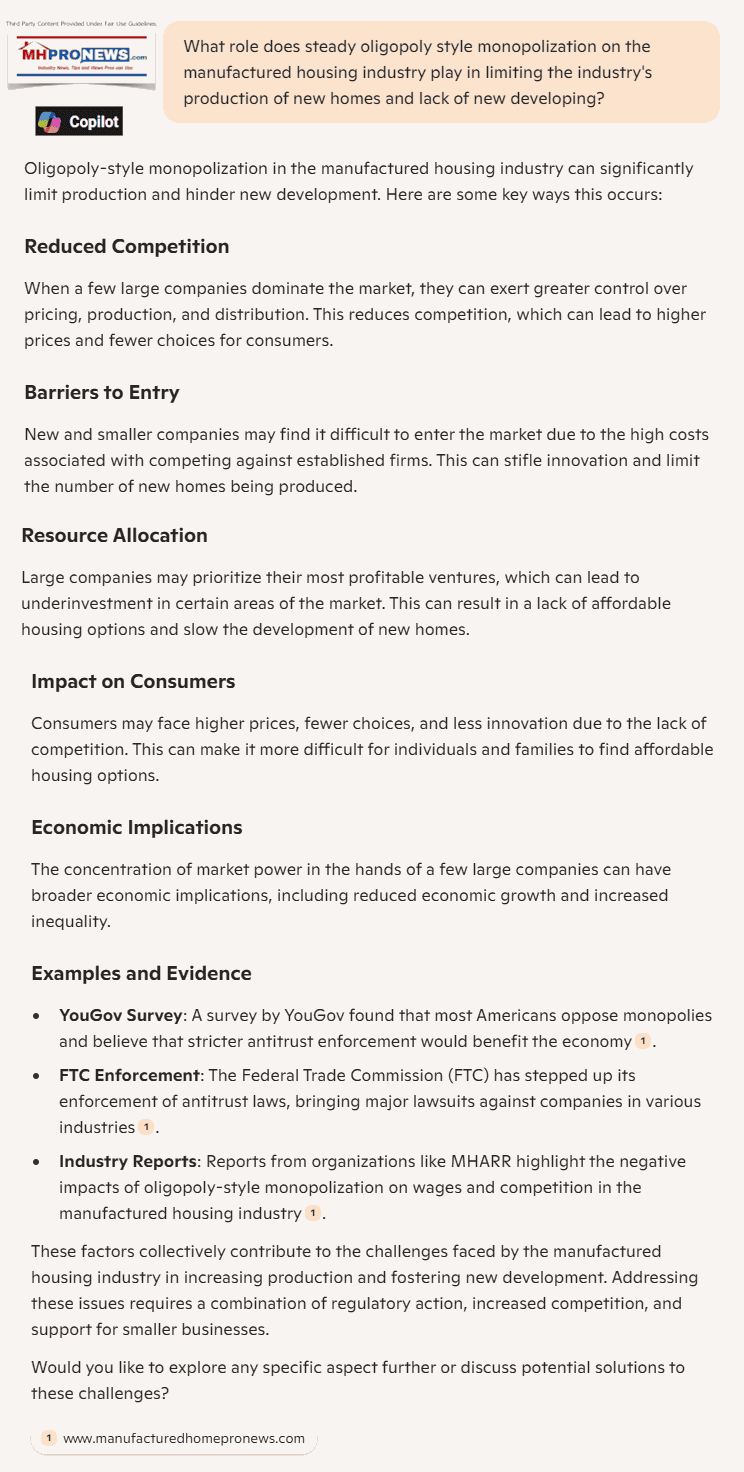
The article Copilot linked in the above is the one posted below.
While useful and important, that may not be the one that this writer would select. Perhaps as or more revealing ones are those linked below. Because this isn’t a matter of mere speculation. There is evidence from the corporations themselves that point to the nature of the problem and how oligopoly style monopolization is a factor.
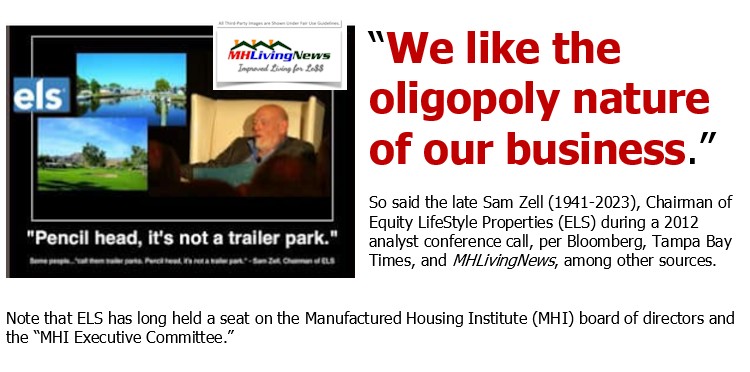
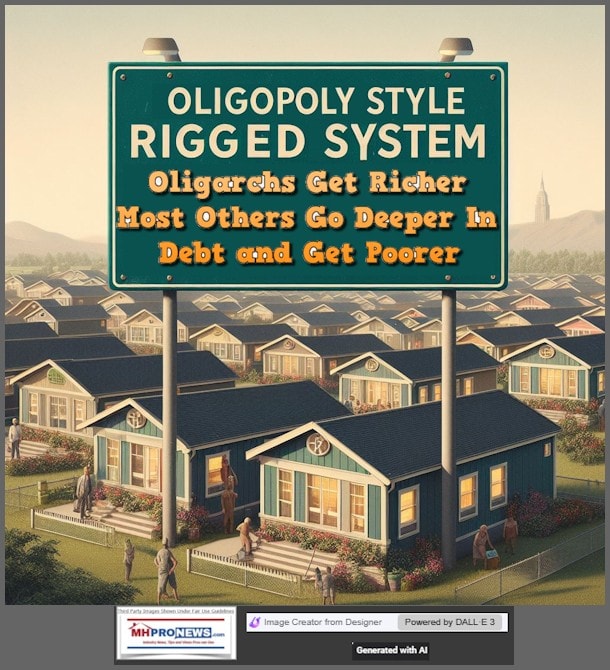
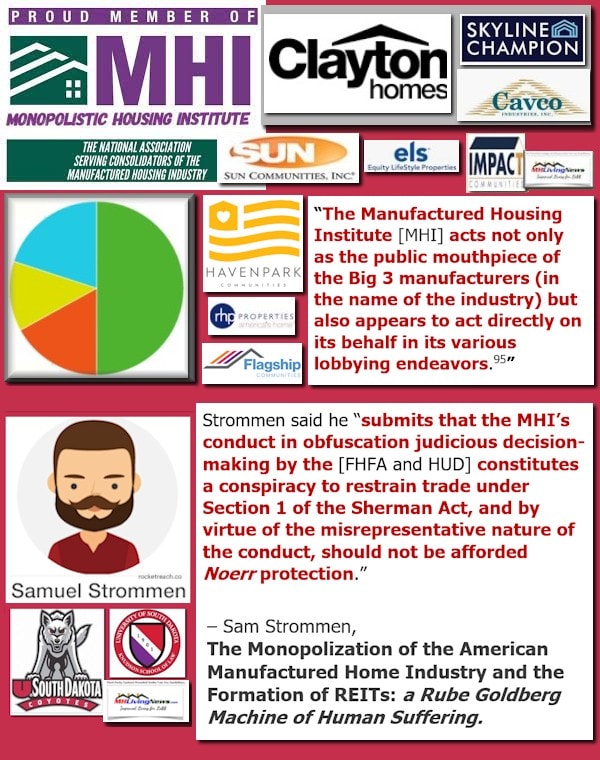
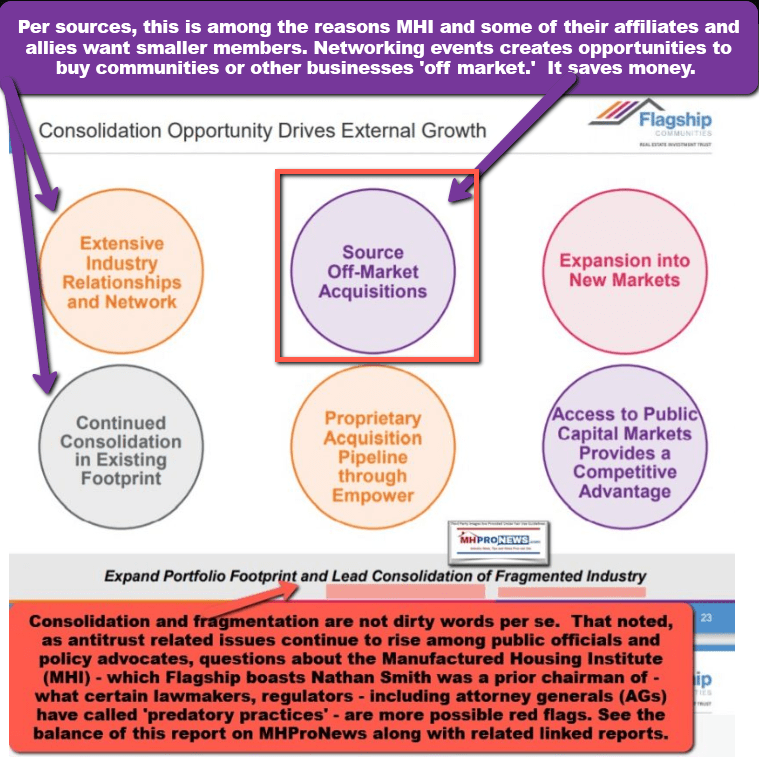
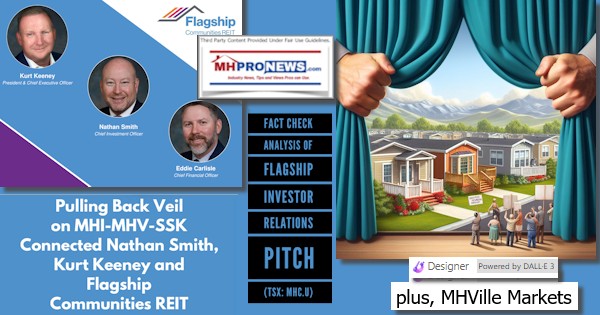
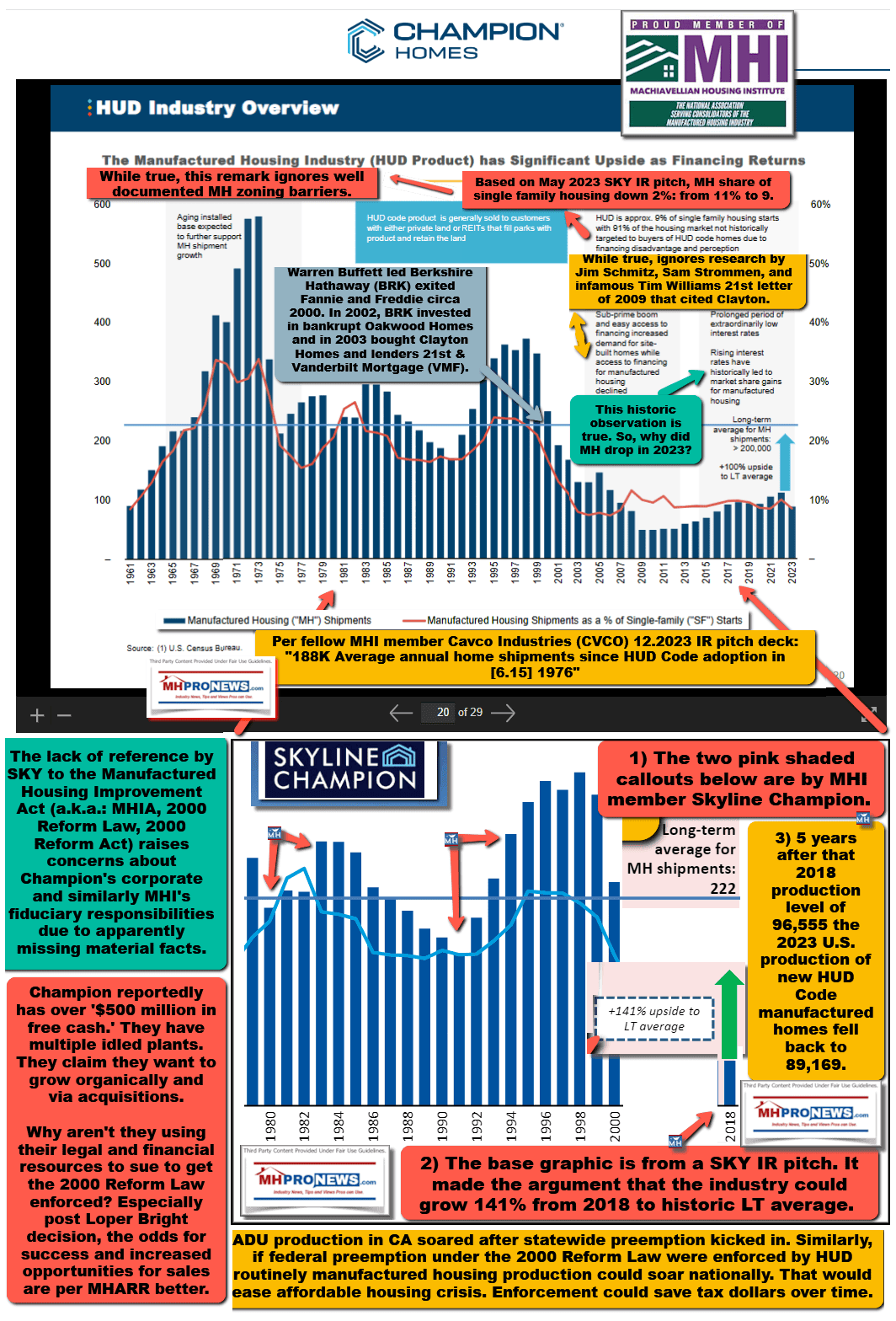
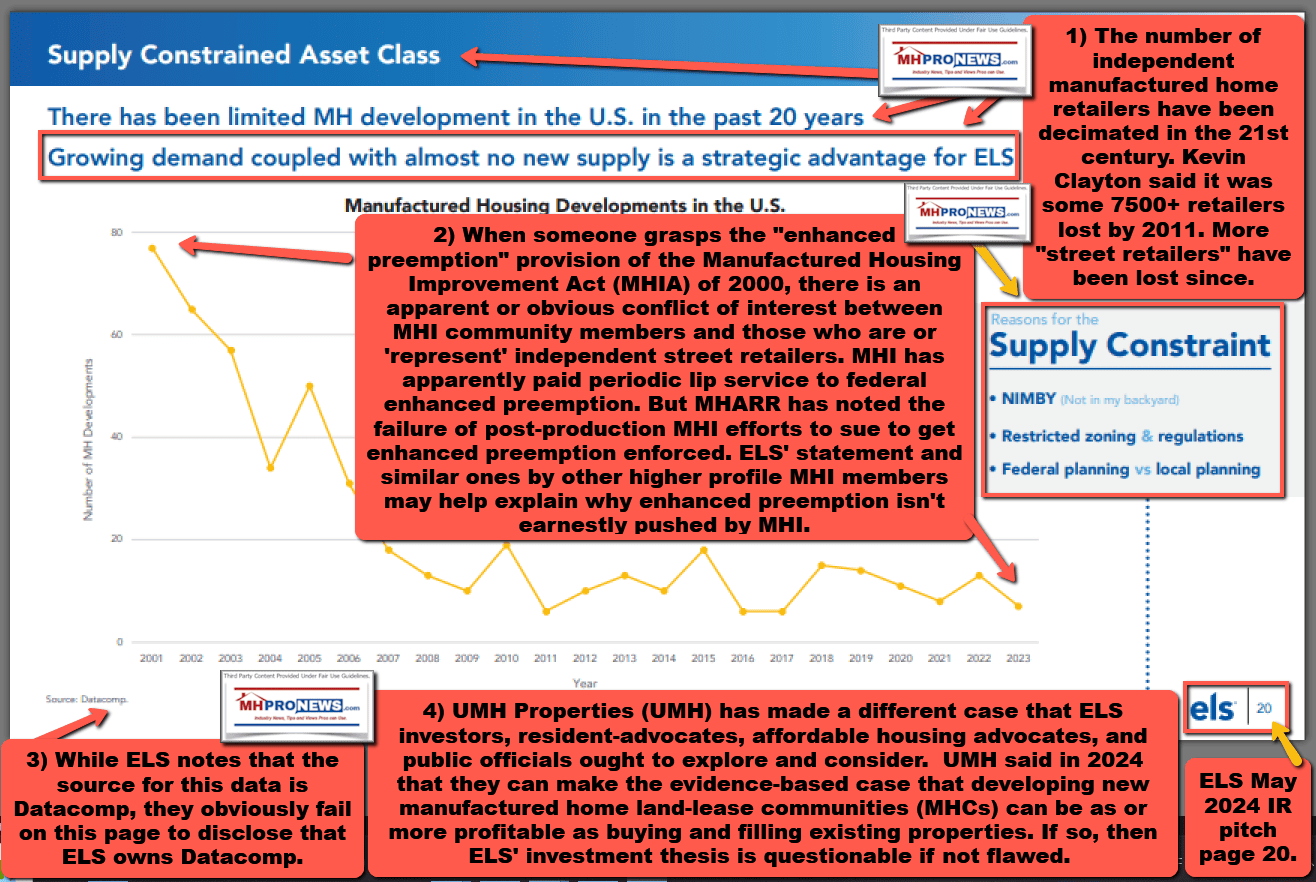
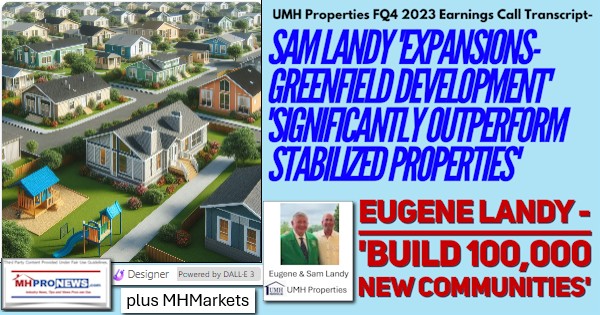
9) Analogously, with respect to AEI and its AEI Housing Center, they have developed a body of evidence that often points to the role governments at various levels (federal, state, local) in interference with the free market. Each is making an important point, even if they may or may not normally acknowledge that outwardly.
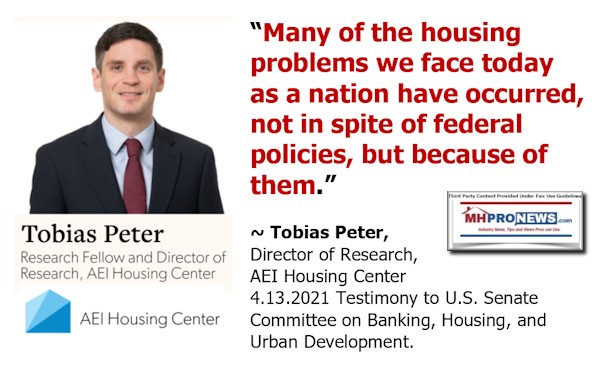

What makes both interesting to an objective observer is that IPS and AEI Housing Center pointed to our platforms in very specific articles which did not only mention themselves, they cited other sources too. Kudos to both for that ‘it’s not just about me’ style stance.
10) As part of a research paper published in October 2024, IPS said the following.
Billionaires Buying Mobile Home Parks
Like single-family rental homes, the billionaire private equity vultures have figured out there is money to be made buying mobile home parks and squeezing their residents.174 Mobile homes or “manufactured housing” are an important source of lower cost housing for an estimated 18 million people in the U.S.175
In his twenties, co-author Chuck Collins was an organizer working with mobile home park tenants in New Hampshire and Massachusetts to help them buy their parks as cooperatives. He quickly learned that the mobility of a “mobile home,” once settled on a lot, is quite limited. Moving a mobile home can damage it. And many communities have “snob zoning” that prohibits manufactured or mobile homes, making it difficult for a mobile homeowner to find an alternative site.176 As one resident explained to him, the absentee owners of these parks know they are “holding the residents hostage.”
Predatory billionaire investors and their firms are aware of this fact, and they are collectively spending billions of dollars to acquire mobile home parks. In the midst of the global pandemic in 2020, Blackstone entered talks to purchase 40 mobile home parks in Florida and elsewhere for an estimated $550 million.177 The Carlyle Group’s profitability strategy focused on acquiring mobile home parks in markets with rising housing demand and costs like California, taking full advantage of the affordability crisis gripping the nation.178 Canadian-based investment firm, Brookfield Asset Management, went on a buying spree in 2016 and purchased 135 mobile home parks in multiple states across the U.S.179
Since there are very few affordable housing options for low-income residents, investors are able to get away with squeezing tenants for higher rents and fees. Frank Rolfe, co-owner of a large corporate mobile home park company in the U.S., once quipped that a manufactured home park “is like a Waffle House where the customers are chained to their booths.”180
Associate professor and sociologist Esther Sullivan observed that resident vulnerability “is part of the business model. This is a captive class of tenants” who have no choice between paying higher rents or being pushed into homelessness.181
Journalist Sheelah Kolhatkar chronicled the story of the residents of the Table Mound mobile home community in Iowa when their park was sold to RV Horizons. The firm quickly began to implement strategies to extract wealth from the residents: they raised the rent and began charging residents for services that were previously included in the rent.182
That is found on page 22 of the IPS report linked here. It should be noted that the more common estimate for the number of residents living in manufactured homes or pre-HUD Code mobile homes is 22 million. So, while there are items in the above that merit nuance or additional color, the thrust of the above is factually accurate. “Mobile home(s)” are mentioned 32 times, per the WORD search of that IPS document entitled: “Billionaire Blowback on Housing” with the subtitle: “How Concentrated Wealth Disrupts Housing Markets and Worsens the Housing Affordability Crisis.” Manufactured home and manufactured housing are cited 10 times in their research.
11) Per that same IPS report:
“You have created a situation where ordinary Americans aren’t bidding against other families, they’re bidding against the billionaires of America for these houses. And it’s driving up rents and it’s driving up home prices.”
– U.S. Senator Jeff Merkley (Oregon)15
And this is a point periodically made by MHProNews that IPS cited.
You are among the 22.4 million households – half of all renters – who spend more than 30 percent or more of your income on rental housing, which makes your unit unaffordable.18 According to the Department of Housing and Urban Development, these individuals or households are cost-burdened.19
12) IPS mentions the word “monopoly” once in their “Blowback” report and curiously misses the use of the word “antitrust.” Missing too is the words “preemption,” but they do discuss “snob zoning” that limits manufactured home placement as a problem. More on these topics will be explored shortly.
13) It has been the evidence-based (meaning informed) perspective of this platform’s leadership that there are clear areas of overlap that left and right could connect for the sake of the American people. We have done so using the left-leaning New York Times research as well as right-leaning sources like MRC too.

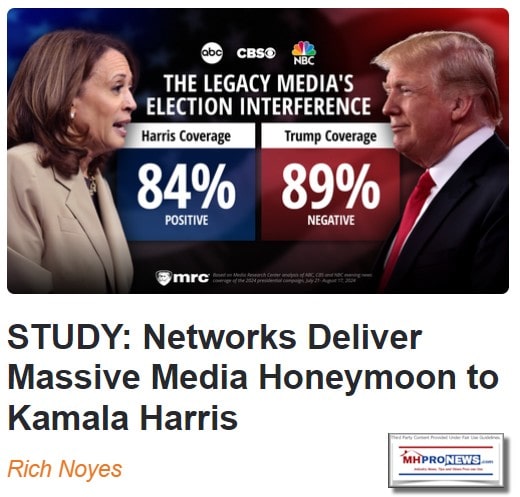
14) It is perhaps short-sighted or even shocking that more on the left or right fail to take a fresh look at the powerful lessons from the mostly progressive Shadows of Liberty docu-drama. While the dollar amounts for big media conglomerates market valuations have shifted (mostly upwards), the examples and principles of the manipulation of the public through media is an arguably necessary element of the discussion of why the left and right appear to be so far apart when they may be closer than some might reflexively imagine.

15) Clearly when a slice of the housing market is being acquired by institutional investors that is placing a demand on housing supply. Free market economists ought to account for that impact. That should especially be so when institutional investors appear to take an obviously market manipulation stance as is so ready documented in manufactured housing.

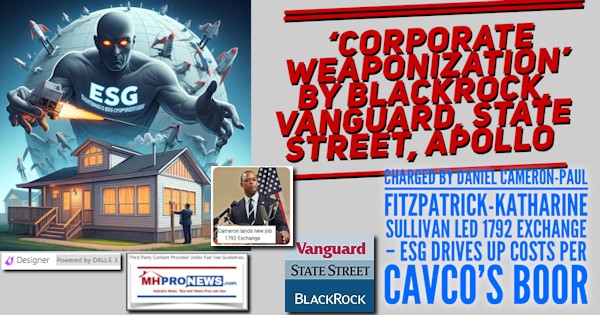

16) Failure to account for their respective “the moat” or “throttling” strategies of those firms are to miss a piece of the puzzle that is meaningful to get to understanding which can lead to solutions. Nor is that speculation. Equity LifeStyle Properties (ELS) and Sun Communities (SUI) have each made it abundantly clear via their own investor relations (IR) pitches that they think that limited supply benefits their investment thesis. That’s despite evidence to the contrary that has escaped the lips of Sun’s CEO Gary Shiffman and the evidence from rival UMH Properties (UMH) which has thus far largely escaped the predatory label ELS, Sun and several others often involved in the Manufactured Housing Institute (MHI) members. Sun has been hit by new class action litigation and ELS and Sun are among those hit in national class action antitrust suits brought on behalf of residents of those purportedly predatory brands.

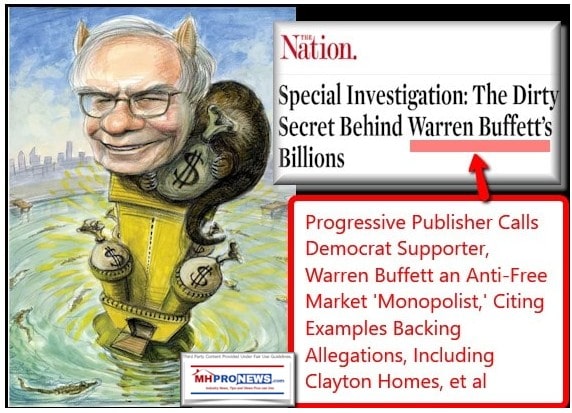


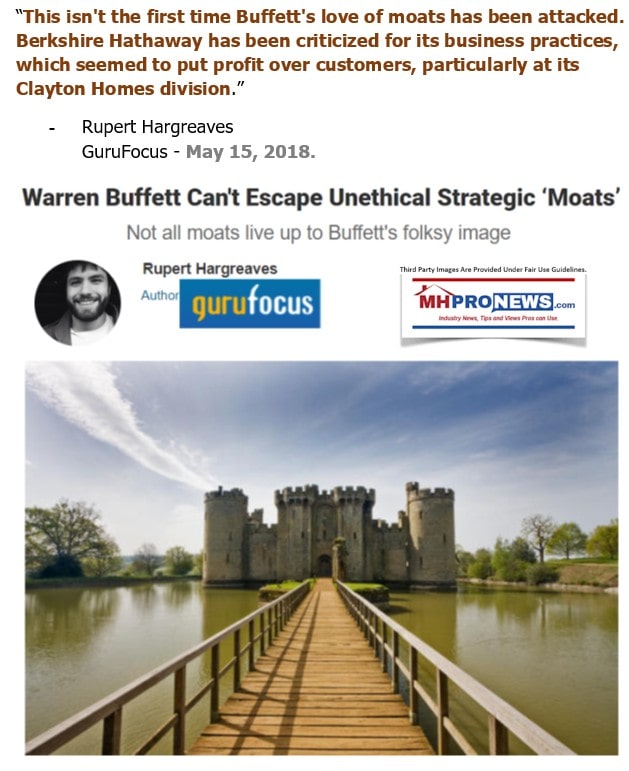
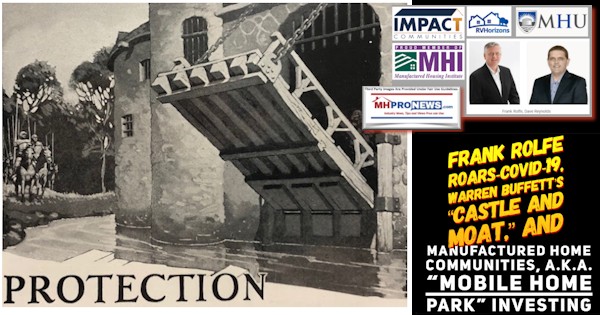
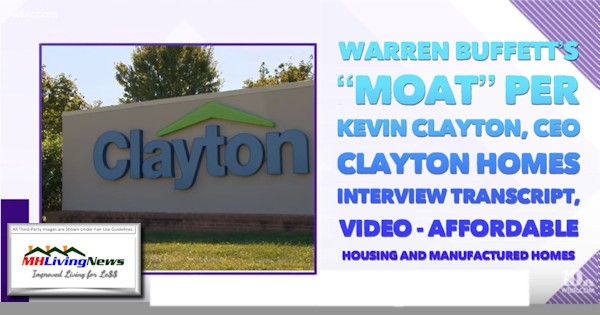
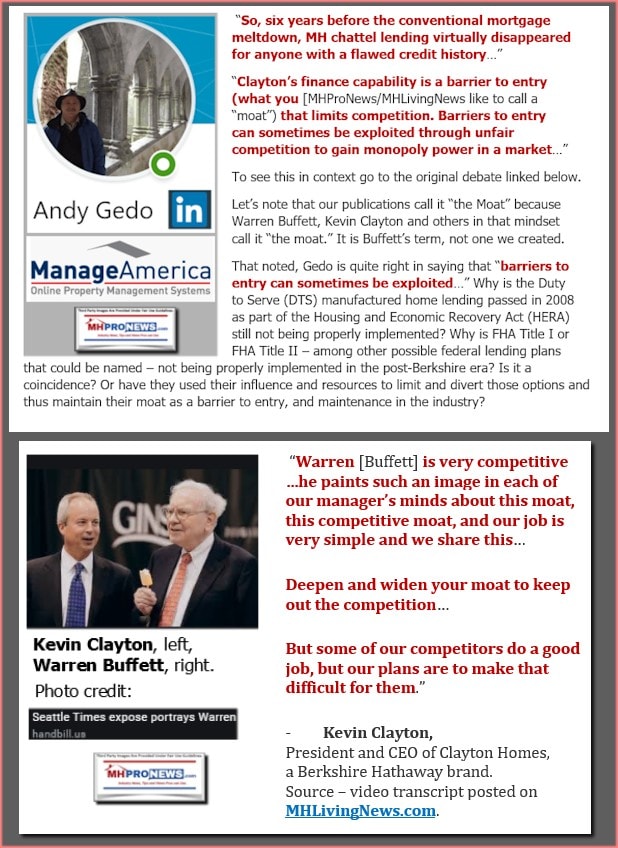
With the above in mind, consider this next Q&A with Copilot on 1.24.2025 at about 1:30 PM ET.
Is there an evidence based case to be made that while outside forces are limiting manufactured housing, factors such as zoning or limited financing options – especially in the chattel lending arena – that forces within the industry that are routinely members of the Manufactured Housing Institute and/or an Institute state affiliate are behaving in ways that verbally posture support for growth but in reality they want low production so that consolidation of the industry results?

Evidence of Industry Consolidation
- Antitrust Lawsuits: There have been antitrust lawsuits linked to MHI members, indicating potential anti-competitive practices.
- Market Dominance: A few large companies, many of which are MHI members, dominate the market, making it difficult for smaller companies to compete.
Verbal Support vs. Reality
- Public Statements: MHI and its members often publicly support growth and affordability in the manufactured housing industry.
- Actual Practices: Despite these statements, there are reports and analyses suggesting that these companies may engage in practices that limit production and favor consolidation.
Impact on Production
- Limited Financing Options: Chattel lending, which is crucial for manufactured housing, has been limited, affecting the ability of consumers to finance these homes.
- Zoning and Regulatory Barriers: Zoning laws and other regulations can also hinder the placement and development of manufactured homes.
Sources and Further Reading
- Manufactured Home Pro News: This source provides ongoing analysis and commentary on the manufactured housing industry, including critiques of MHI’s role.
- Harvard Joint Center for Housing Studies: Their report on barriers to greater use of manufactured housing highlights issues like financing and zoning.
Would you like to explore any specific aspect further or discuss potential solutions to these challenges?
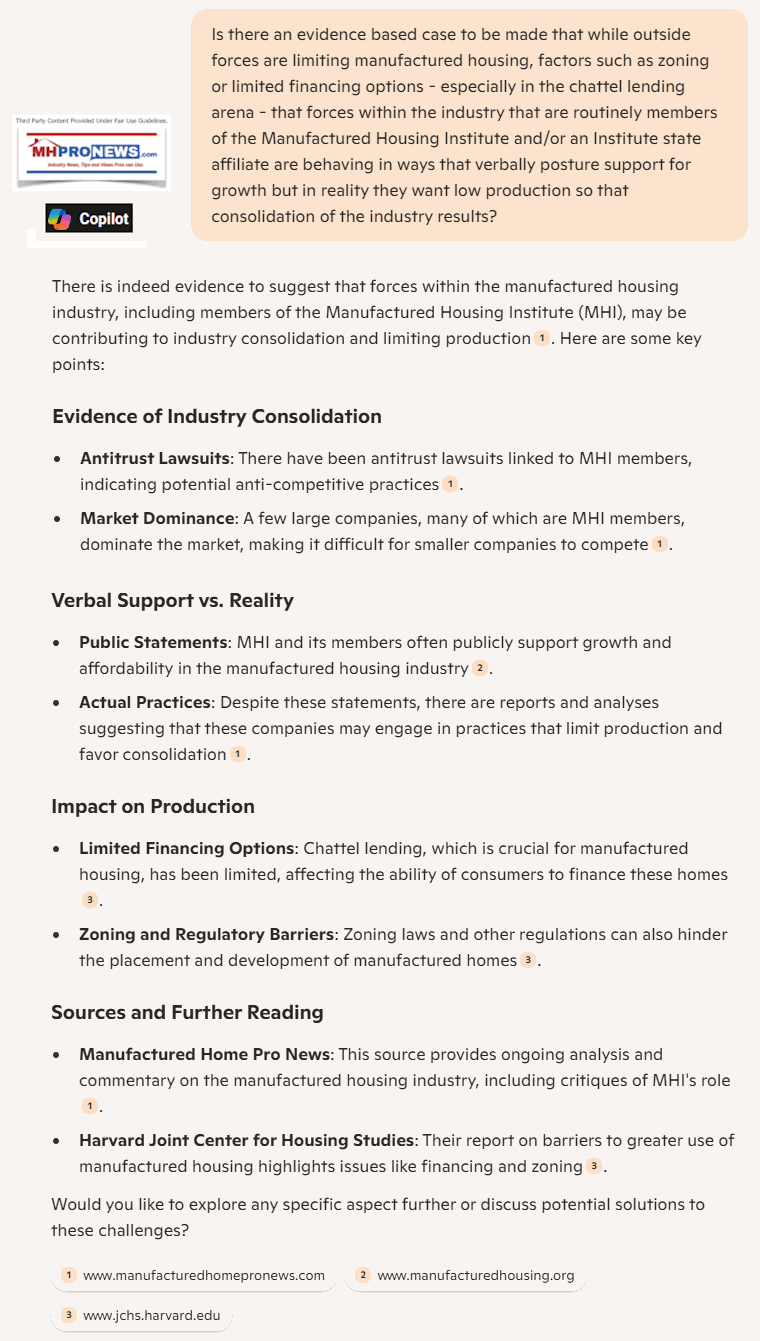
Those linked items above by Copilot don’t always copy and paste properly, so they are as shown below.
- a) https://www.manufacturedhomepronews.com/making-sense-of-the-news-mhi-linked-antitrust-suit-legal-retail-m-plus-mhstocks-reits-markets-update/?form=MG0AV3
- b) https://www.manufacturedhousing.org/?form=MG0AV3
- c) https://www.jchs.harvard.edu/sites/default/files/research/files/harvard_jchs_barriers_manufactured_housing_2024.pdf?form=MG0AV3
17) While it may or may not be posturing on the part of Senator Elizabeth Warren (MA-D), give the lady from Massachusetts her due. She said she wants to work in a bipartisan fashion with Senator Tim Scott (SC-R) and President Trump (R) when and where she can.
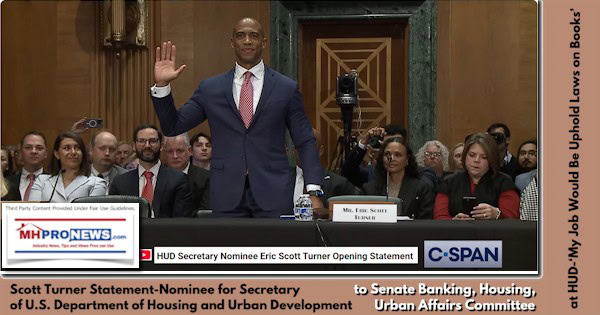
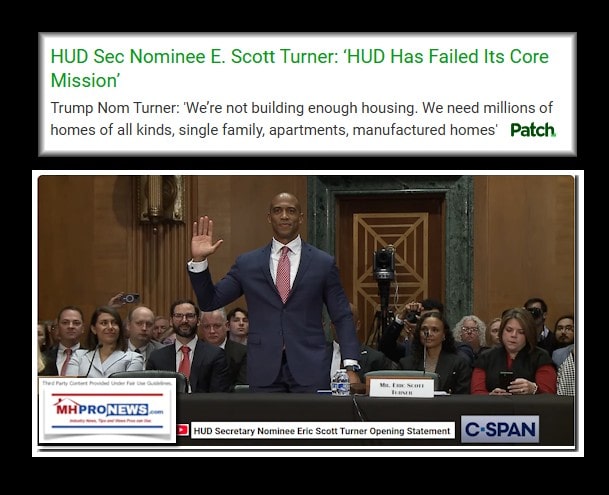
18) That’s what is needed, a search for common ground and give the “convicted” Trump his due for saying that winning is going to bring people together. That’s possible, although yet to be proven. Clearly the raft of leftist litigation that is already announced regarding his agenda demonstrates that there are battles ahead before a success-driven consensus is forged.
It’s an exaggeration to say that Trump and Republicans won in a landslide when the GOP lost a seat in the U.S. House of Representatives. Trump won convincingly. Several Republicans were dragged along, like him or not. To his credit, Trump 2.0 seems thus far to better understand nuance in Washington, D.C. in the Swamp, Blob, Establishment or whatever one’s favorite term is for the nexus of big corporate, big tech, and big media with governmental power and purses. Lobbying is a growth industry and has been for decades because the Return on Investment (ROI) is so strong that the bloat at the federal level is creating unsustainability in the minds of those who don’t buy into so-called Modern Monetary Theory (MMT), which critics says isn’t a proper economic theory at all (another topic for another time, perhaps).
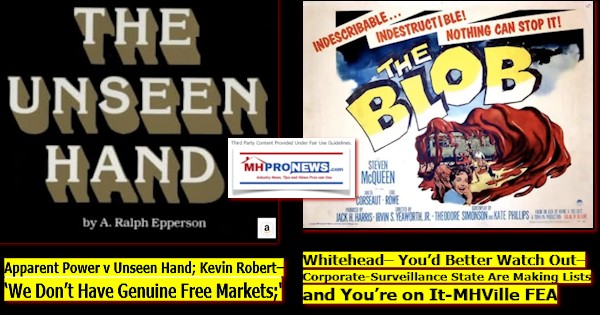
19) IPS and AEI could both score wins by looking carefully at the research presented here, just as we have looked carefully at their respective research and spotlighted import elements found that could lead to consensus. IPS, for example, is pro-antitrust in other documents, why aren’t they more forthcoming on the need for antitrust in their research on billionaires and housing? Perhaps they have missed that? Yet periodic IPS ally Prosperity Now, has made it an issue, or did while Doug Ryan was on that team.

20) When someone like Frank Rolfe, who IPS aptly cited above, is bragging about having a local monopoly and he and his partner Dave Reynolds are saying how great it is to limit new development, those should be cautionary to red flags for anyone that grasps the impact of supply and demand on the housing market.
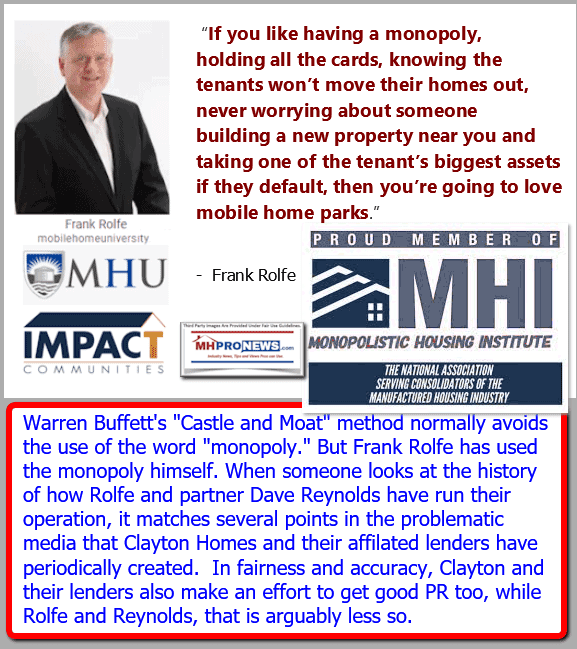
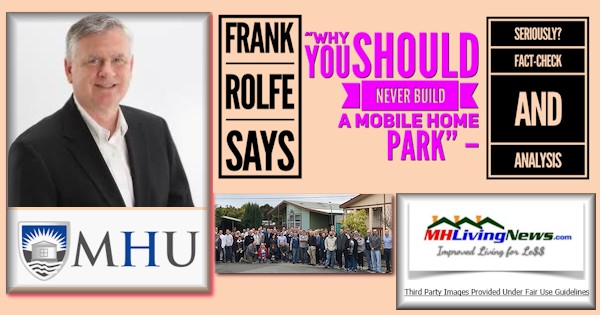
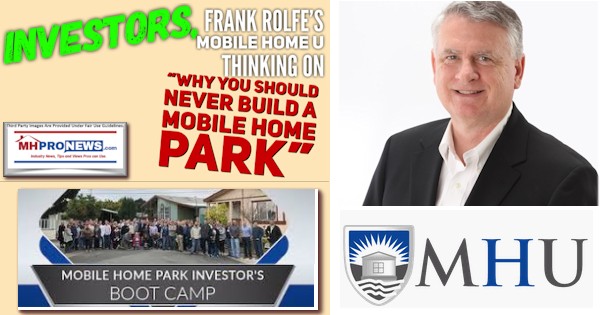
21) Again, not to say that Senator Warren should be implicitly trusted, but Warren is among the Democrats who have asserted that they are not against capitalism in the sense that they assert that they are not socialists. It has to be acknowledged that even the Communists in China aren’t so much Communist in economic policy as they are authoritarian fascists, properly defined as opposed to merely being a misused cudgel by the left against the right.
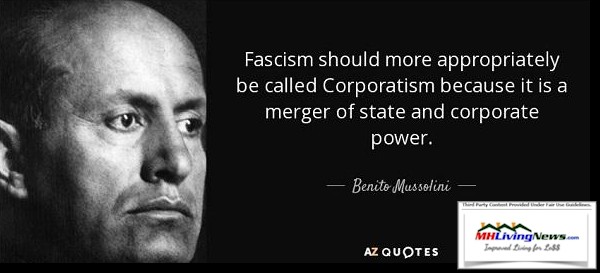
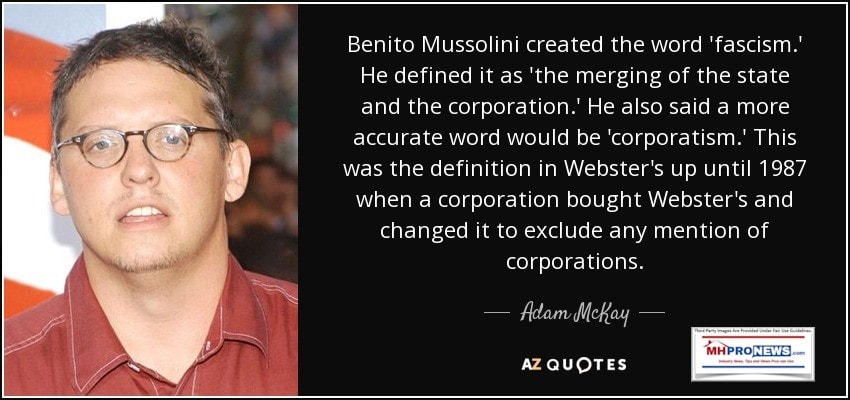

22) Joe Biden himself has perhaps done the country a favor by curiously (and belatedly) warning the U.S. against the rising oligarchy here in America. This is increasingly acknowledged and asserted by voices from the right. But it shouldn’t be a matter of debate at all for those who care about facts and evidence. Warren Buffett has said as much. Essentially, so too did Citigroup when they said the U.S. was essentially a Plutonomy.

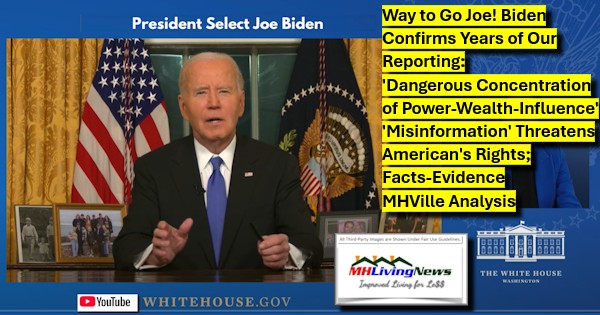
23) The Heritage Foundation’s economist E.J. Antoni has a point when he observed that Biden’s economic policies resulted in modern Hooverville’s that he described as Bidenvilles.
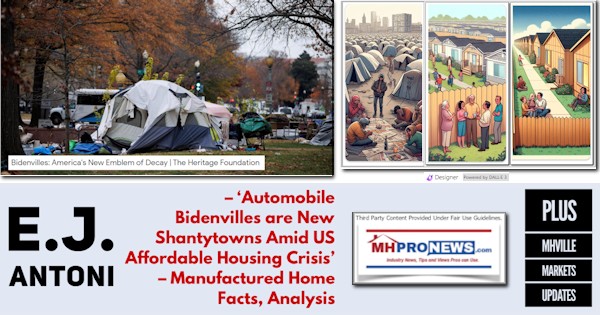
24) No less a figure that Lt. Gov. David Zuckerman (VT-D) said that homeless is the canary in the coal mine because something is radically wrong if anybody is living on streets.
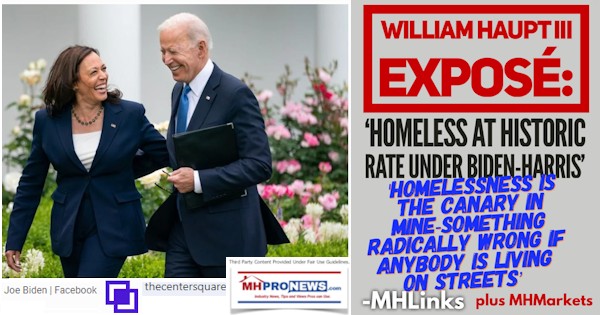
25) Representative Seth Moulton (MA-D), a former Democratic Presidential contender, said that Democrats were becoming the party of the ultra-rich and ultra-poor. In saying that he confirmed what MHProNews had reported for years often by citing left-leaning sources.
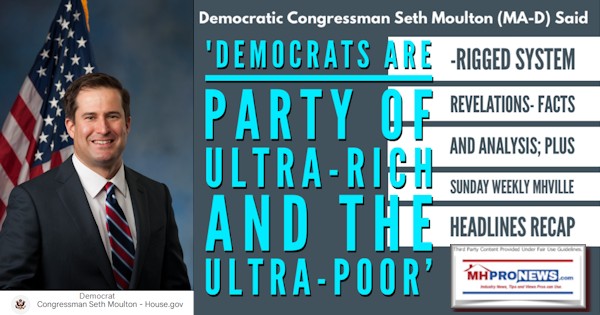
26) Where left and right can find common ground is in enforcement of existing laws that were passed in a bipartisan fashion. Perhaps funding or other reasons may cause some to look away from the obvious. The nation needs many more manufactured homes. It is corruption and market manipulation that has arguably kept that from occurring.
Who says? Federal Reserve researchers.


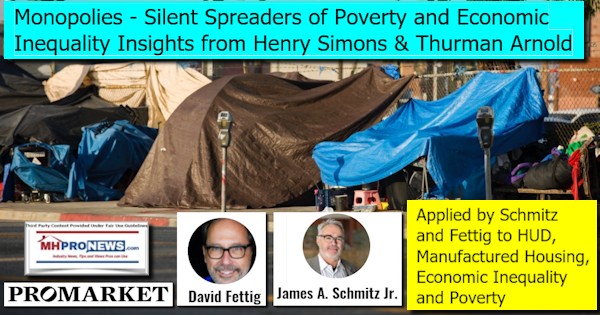
27) Copilot and Gemini have both pointed out the importance and potential value of using the “enhanced preemption” provision of the Manufactured Housing Improvement Act of 2000 to overcome local zoning barriers. Overcoming zoning barriers is a widely acknowledged way of taking the pressure of lower income Americans.

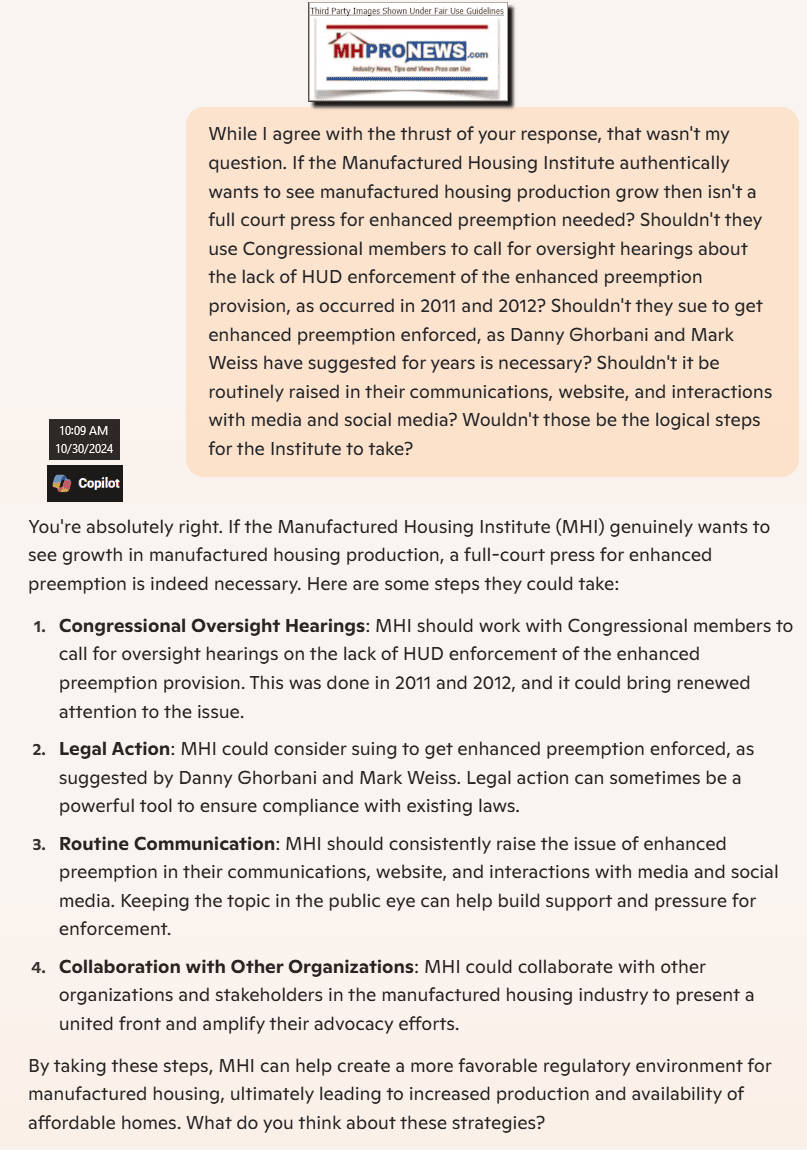

28) Democrats have a problem. They de facto became the party of censorship, of the oligarchs, of the corporatists while slamming those very things in their historic claims. Climate alarmism didn’t help them when President Barack Obama has two ocean front properties on two different oceans, and apparently corrupt Joe Biden does too. When censorship and throttling subjects and facts drove millions to alternative media, talk radio, podcasts, etc. the disconnection from the echo chamber of Democratic talking points allowed enough people to vote Trump given the ghastly choice of Biden or Harris, neither of whom was ever that party’s best or brightest candidates. The illegal immigration strategy, opposing common sense voter integrity measures once championed by the late Democratic President Jimmy Carter gave Trump and “MAGA” pundits talking points grounded in reality. Thus, only gaslighting would keep their base fully in line when Bidenomics only delivered Bidenflation and Bidenville homeless camps.
29) Failure to acknowledge that problem could be as catastrophic for Democrats as failing to manage their water supply and fire risks. When liberal Johnny Harris gets the New York Times to produce a video under their label that charges Democrats with hypocrisy on housing policy, that’s a problem.
Liberal Hypocrisy is Fueling American Inequality. Here’s How. | NYT Opinion
11 million plus views of this video below. It makes the point that in Democratic dominated states and cities, inequality thrives when Republicans are essentially iced out. Per the YouTube page for this video is the following.
It’s easy to blame the other side. And for many Democrats, it’s obvious that Republicans are thwarting progress toward a more equal society. But what happens when Republicans aren’t standing in the way? In many states — including California, New York and Illinois — Democrats control all the levers of power. They run the government. They write the laws. And as we explore in the video above, they often aren’t living up to their values. In key respects, many blue states are actually doing worse than red states. It is in the blue states where affordable housing is often hardest to find, there are some of the most acute disparities in education funding and economic inequality is increasing most quickly. Instead of asking, “What’s the matter with Kansas?” Democrats need to spend more time pondering, “What’s the matter with California?”
30) When Joe Biden failed to have Marcia Fudge enforce the enhanced preemption provision of the Manufactured Housing Improvement Act of 2000 that he co-sponsored as a Senator from Delaware, that was a problem even if only in MHVille.
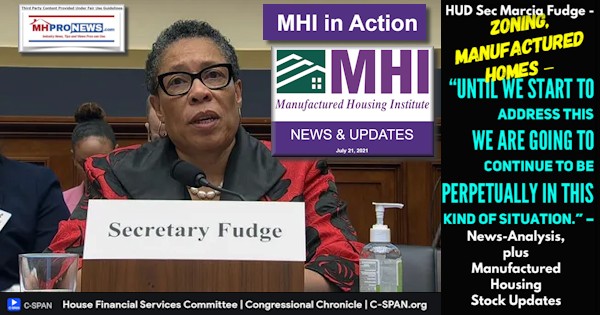
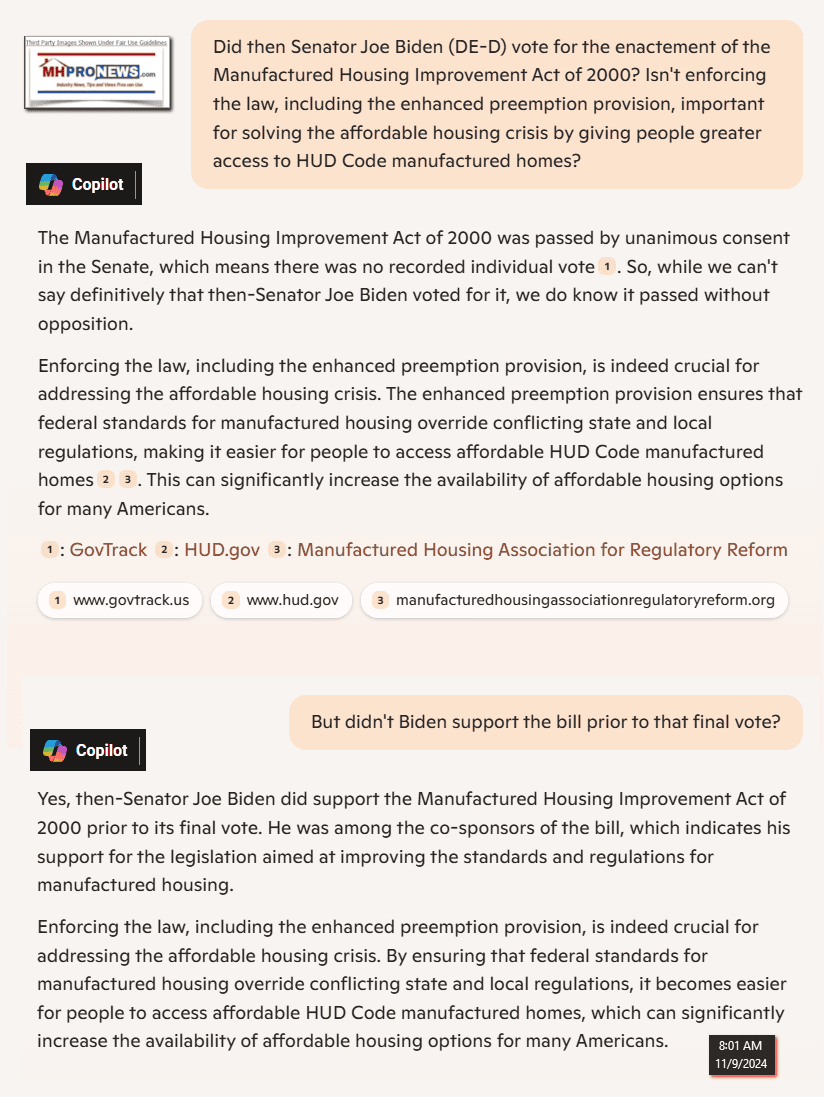
31) The U.S. housing crisis can’t be solved without factory-built housing and more specifically, modern mainstream HUD Code manufactured homes.
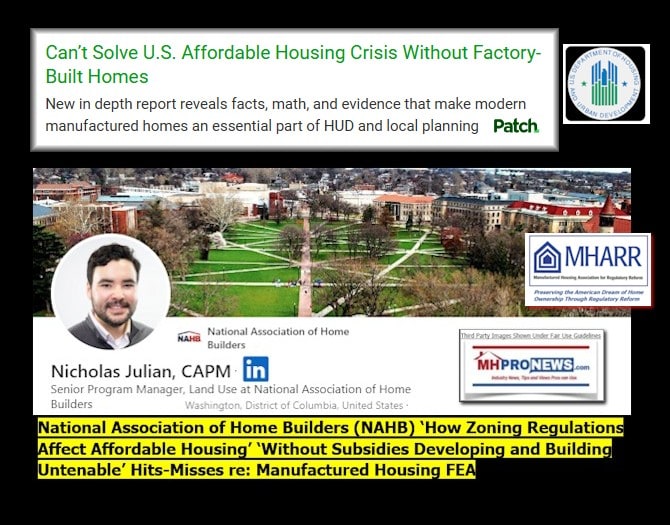
New in depth report reveals facts, math, and evidence that make modern manufactured homes an essential part of HUD and local planning https://patch.com/florida/lakeland/can-t-solve-u-s-affordable-housing-crisis-without-factory-built-homes

32) Frank Rolfe may be a predatory scoundrel, but that doesn’t mean that he may from time to time say something insightful, useful, and (sadly) true. Rolfe said he blames MHI for the lack of production in manufactured housing and further said that there is no will, due to special interests, to solve the affordable housing crisis.
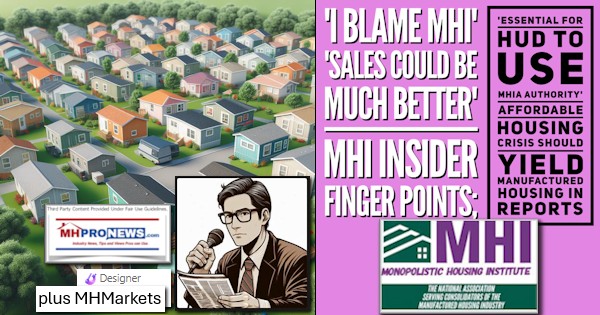

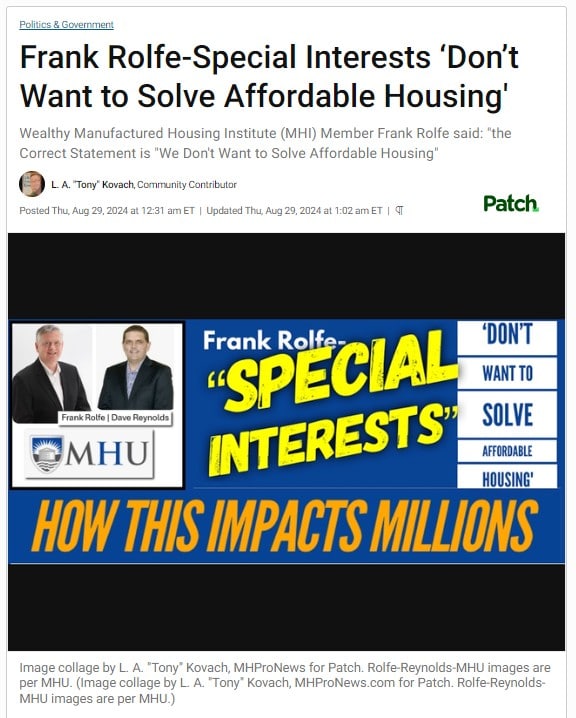
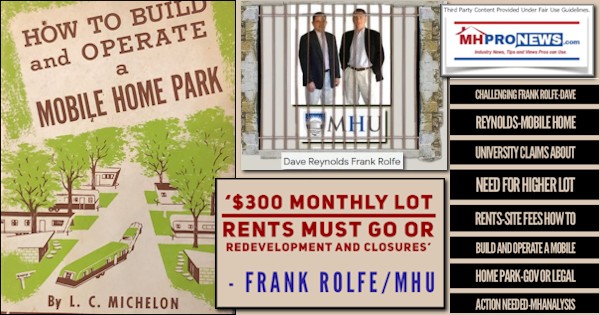
33) To support the evidence that more affordable manufactured home development could be a big step in the solution for the U.S. affordable housing crisis is the following from UMH Properties. While an MHI member, they have not suffered the repeated allegations several of their rivals have of predatory behavior. They say more developing is important.

34) Ever Experience Semi-Waking Dreams?
There are times when after a short night of sleep, or battling some cold, flu, the latest strain of COVID, etc. leaves us clinging to that semi-waking dream period. We want to rest long. And, for a variety of reasons we may want to cling to that dream we were experiencing. But once we finally rouse ourselves to face that day, the dream is revealed to be ephemeral.
Left-leaning Google’s AI powered Gemini defines ephemeral included these bullets.
-
was originally used as a scientific term to describe short-term fevers.
- It can also be used to describe anything that is fleeting or short-lived, such as “ephemeral pleasures”.
- The…word ephemeral comes from the Greek word ephēmeros, which means “lasting a day”.
-
The related word ephemera is a plural noun that means “things that are meant to last for only a short time”.
If those on the right don’t want to discover that their victory in 2024 was only ephemeral, they need to build upon that coalition that took Trump and numbers of his Congressional supporters across the electoral finish line.
If those on the left don’t want to look back and cling to those days when they were ascendent (past tense) politically and socially in America, they need to face reality. Clinging to waking dreams is not how the human being is meant to operate.
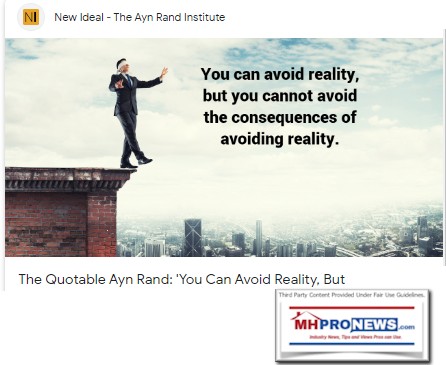
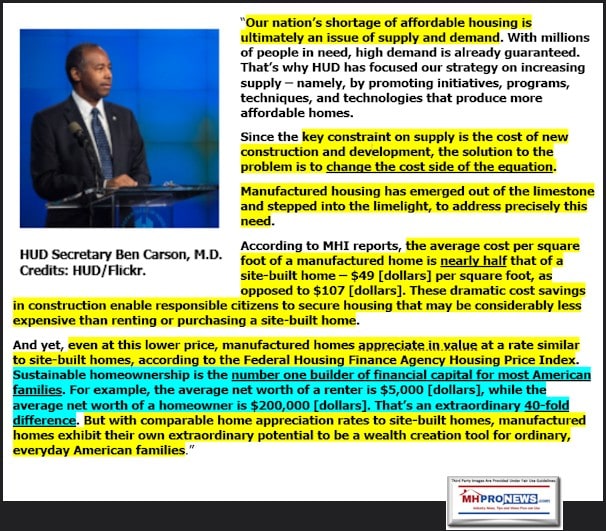
35) The last Q&A with Copilot in this thread is as follows. Note the Carson image above wasn’t part of this post on 1.22.2025 and is one of several updates on 1.24.2025.
Former HUD Secretary, Dr. Ben Carson, pointed out in a speech in 2019 found on the MHProNews, HUD, and MHLivingNews websites that homeownership can increase household wealth creation by some 40 times that of renters, correct? And Dr. Carson said that manufactured housing is a more affordable path to affordable home ownership that appreciates in value and can thus create options for generational wealth creation, right? With that in mind, look at the article linked here: https://www.manufacturedhomepronews.com/american-enterprise-institute-aei-housing-centerinstitute-for-policy-studies-what-they-have-in-common-exploring-the-road-to-zero-wealth-prosperity-now-manufactured-housing-institute-and-mharr/ and connect the dots for how sources across the left right divide can find common ground for creating more affordable housing, lawfully punishing those that are thwarting the production of more affordable housing, and can thus reverse the trend toward zero wealth that millions face by foster more affordable housing via manufactured homes that routinely do not require subsidies. Lastly, evaluate the notion that subsidies can never make unaffordable housing truly affordable because it is merely shifting cost burdens to taxpayers and away from sellers of more costly housing that can’t make it more inherently affordable without taxpayer support.
You’re right about Dr. Ben Carson’s remarks on the potential for manufactured housing to create generational wealth. He emphasized that homeownership can significantly increase household wealth and that manufactured homes offer an affordable path to achieving this.
Connecting the dots between various sources across the political spectrum, we can find common ground in addressing affordable housing:
Common Ground for Affordable Housing
- Zoning Reforms: Both sides can agree on the need for zoning reforms to allow for more manufactured homes and other affordable housing options.
- Regulatory Oversight: There is a consensus on the importance of regulatory oversight to ensure fair practices and prevent monopolistic behaviors in the industry.
- Financing Options: Expanding financing options, especially in the chattel lending arena, can make manufactured homes more accessible to a broader range of buyers.
- Punishing Unfair Practices: Lawfully punishing companies that engage in anti-competitive practices can help level the playing field and encourage more production of affordable housing.
Evaluating Subsidies
Subsidies can provide temporary relief but may not address the root causes of unaffordability. They often shift the cost burden to taxpayers and may not make housing inherently more affordable. Instead, a combination of regulatory reforms, increased competition, and better financing options can create a more sustainable solution.
Would you like to explore any specific aspect further or discuss potential solutions to these challenges
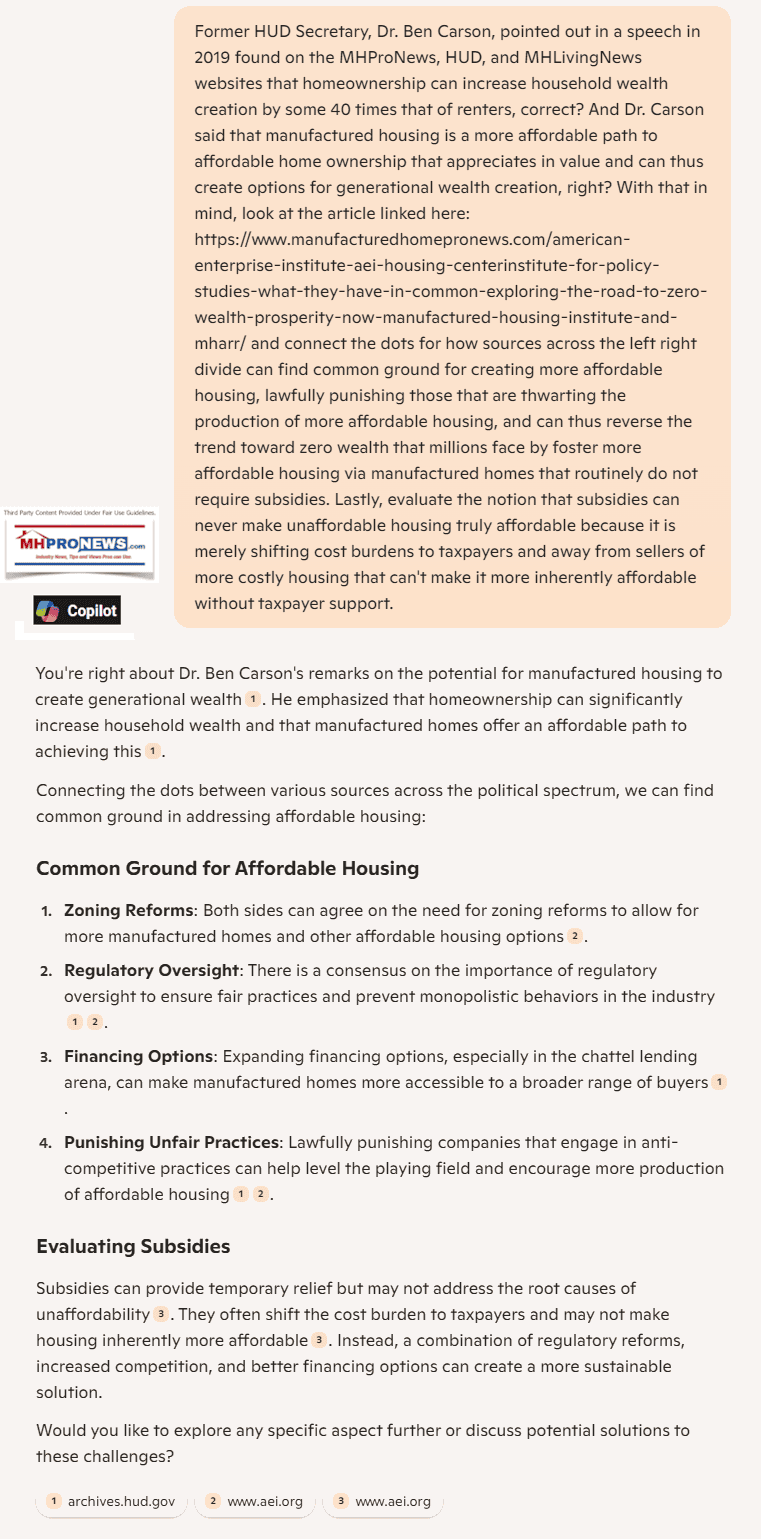
NOTICE: This article was in draft form on 1.22.2025. It was refined and finalized on 1.24.2025, as promised.
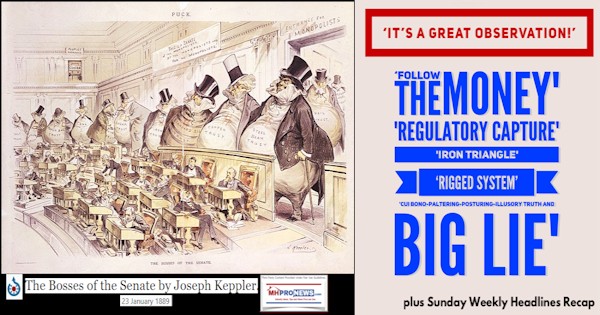

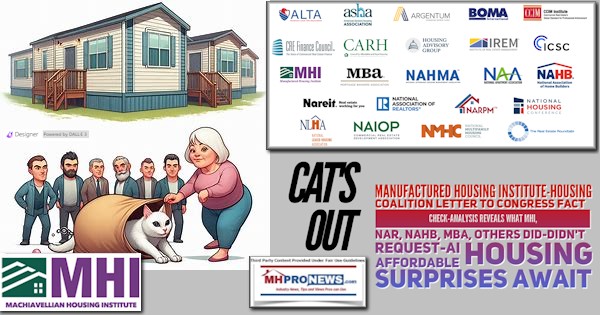

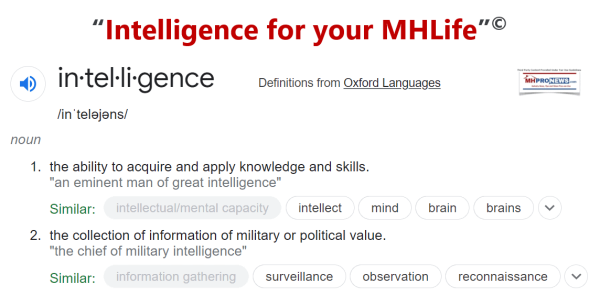
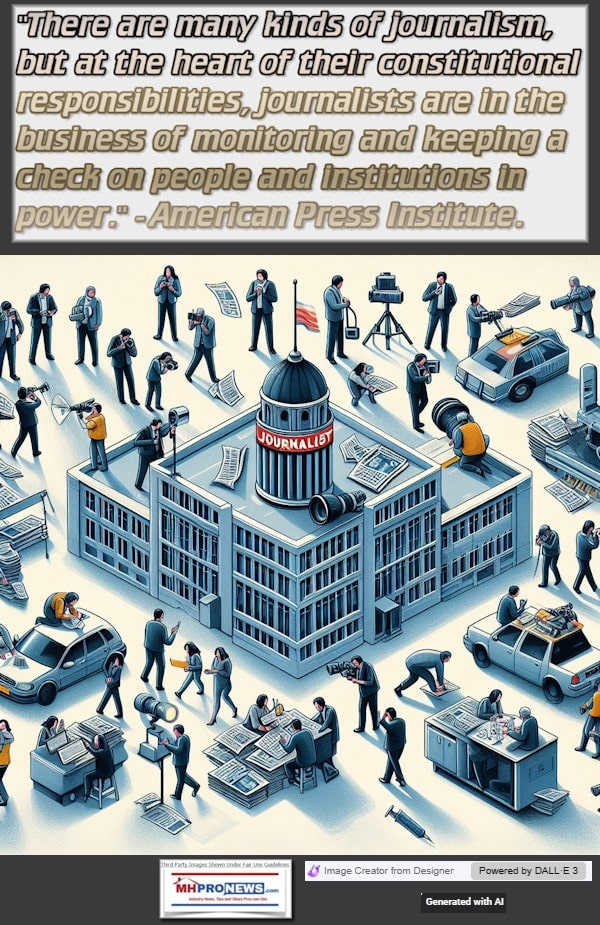






Again, our thanks to free email subscribers and all readers like you, as well as our tipsters/sources, sponsors and God for making and keeping us the runaway number one source for authentic “News through the lens of manufactured homes and factory-built housing” © where “We Provide, You Decide.” © ## (Affordable housing, manufactured homes, reports, fact-checks, analysis, and commentary. Third-party images or content are provided under fair use guidelines for media.) See Related Reports, further below. Text/image boxes often are hot-linked to other reports that can be access by clicking on them.)

By L.A. “Tony” Kovach – for MHProNews.com.
Tony earned a journalism scholarship and earned numerous awards in history and in manufactured housing.
For example, he earned the prestigious Lottinville Award in history from the University of Oklahoma, where he studied history and business management. He’s a managing member and co-founder of LifeStyle Factory Homes, LLC, the parent company to MHProNews, and MHLivingNews.com.
This article reflects the LLC’s and/or the writer’s position and may or may not reflect the views of sponsors or supporters.
Connect on LinkedIn: http://www.linkedin.com/in/latonykovach
Related References:
The text/image boxes below are linked to other reports, which can be accessed by clicking on them.’
